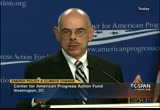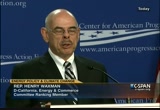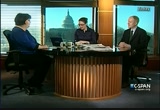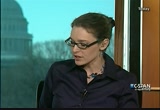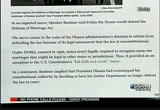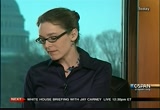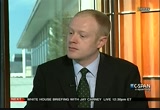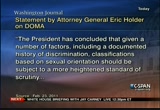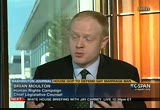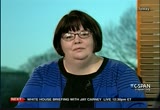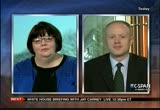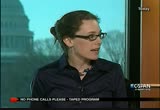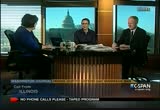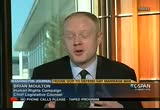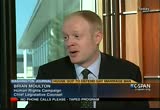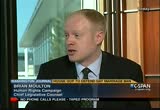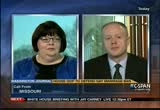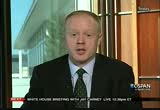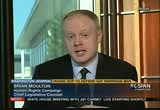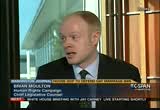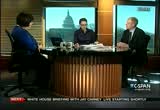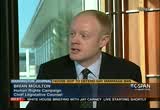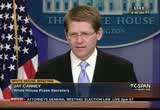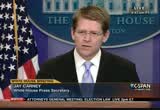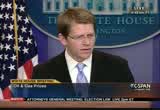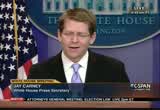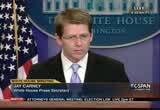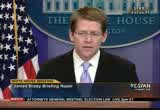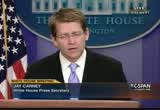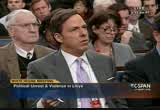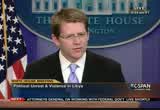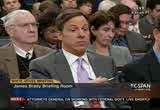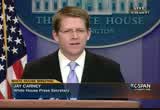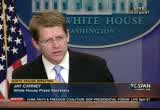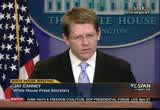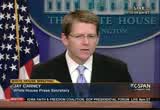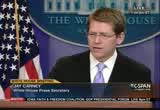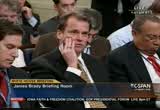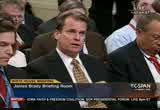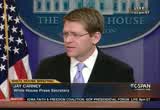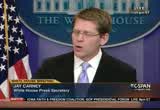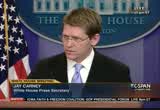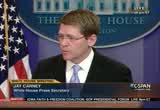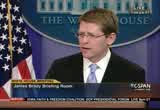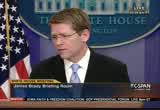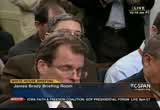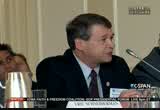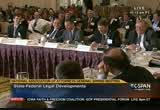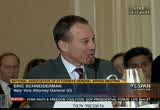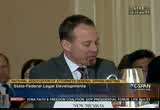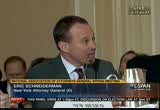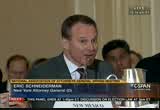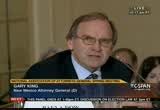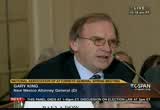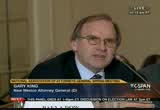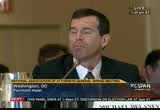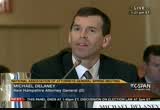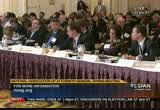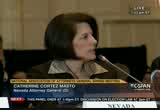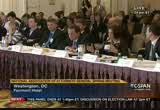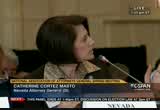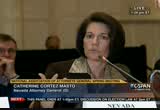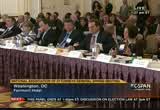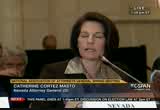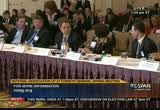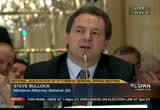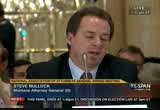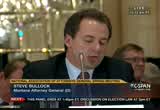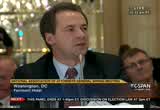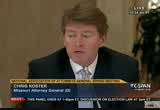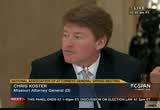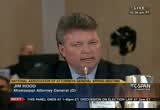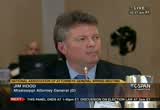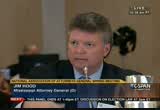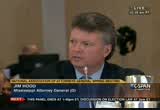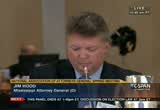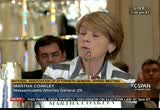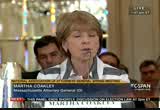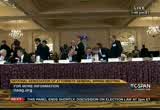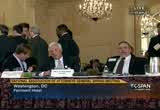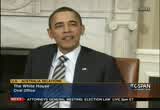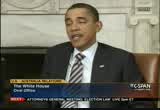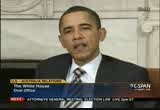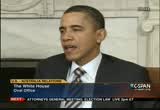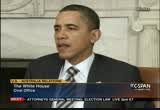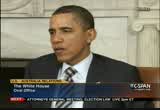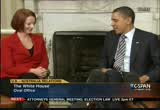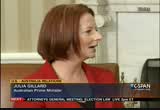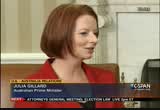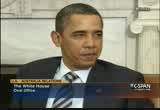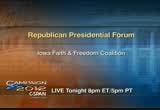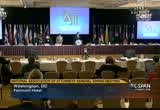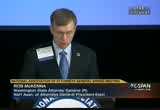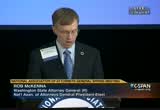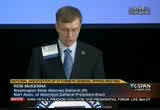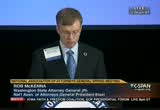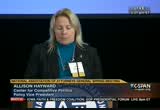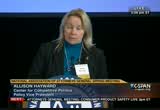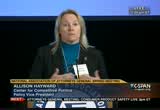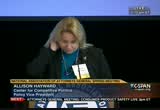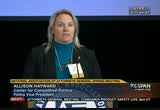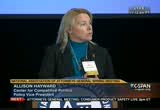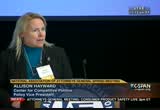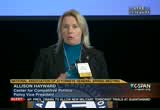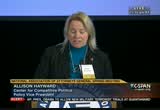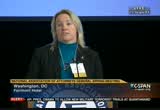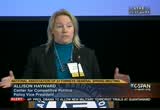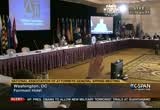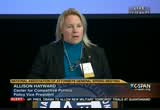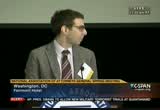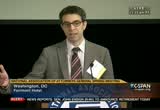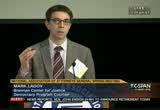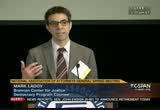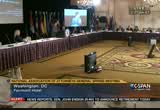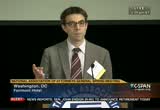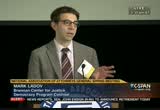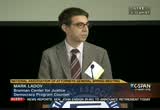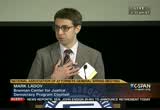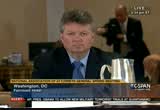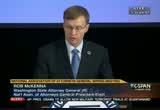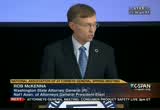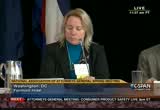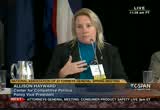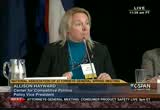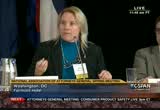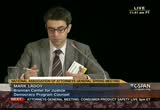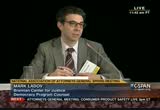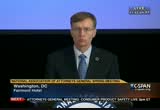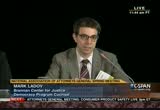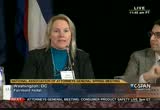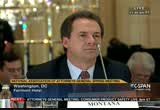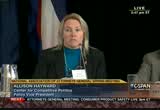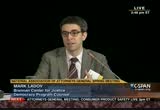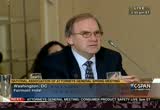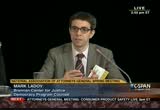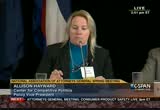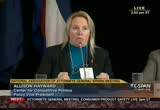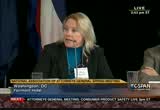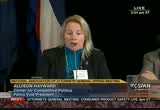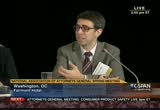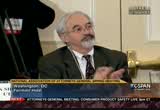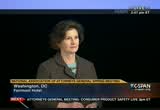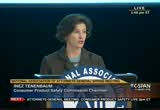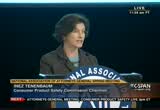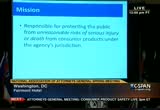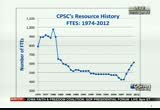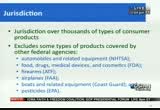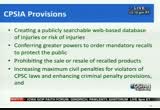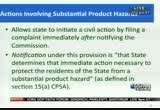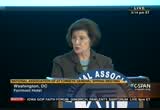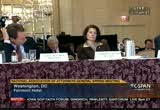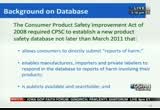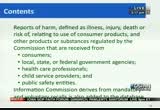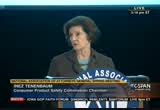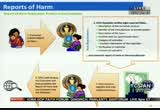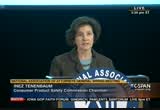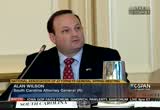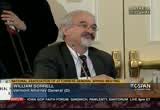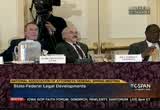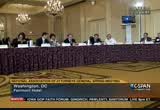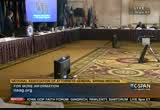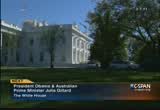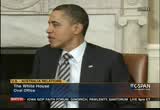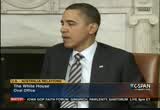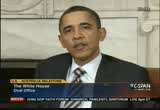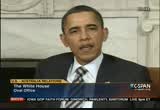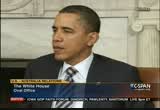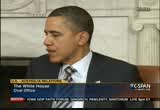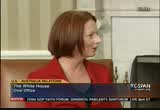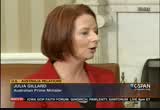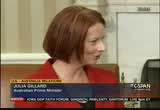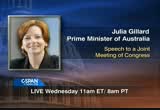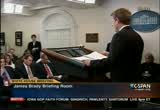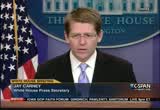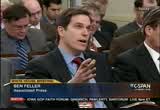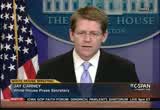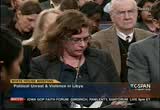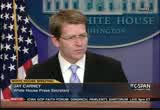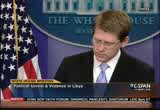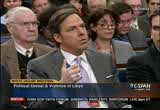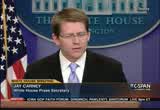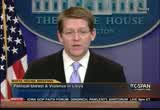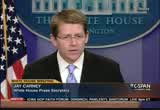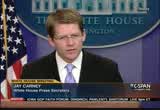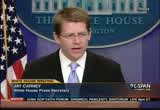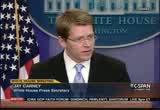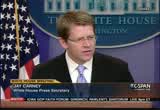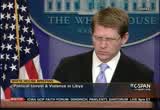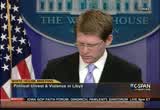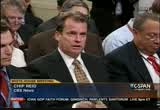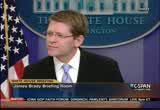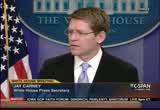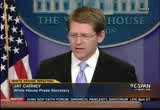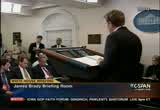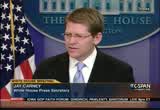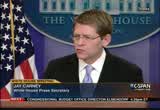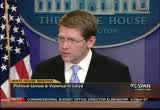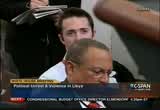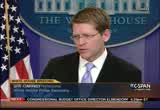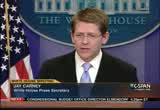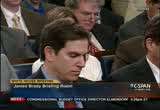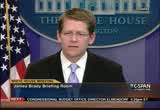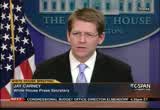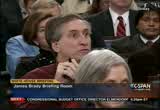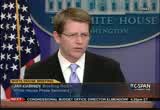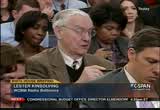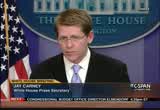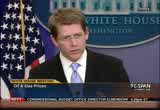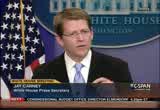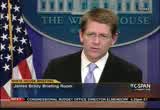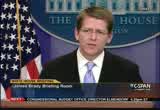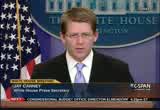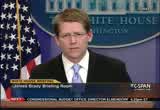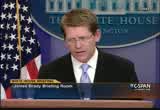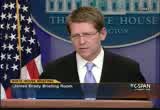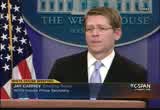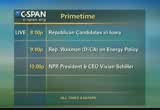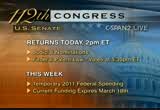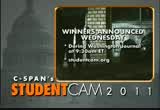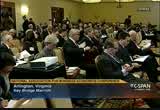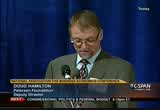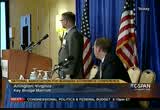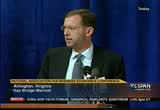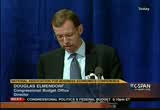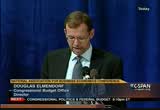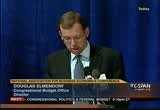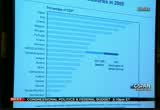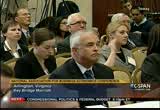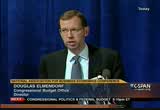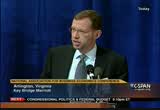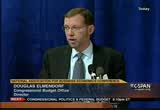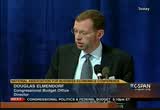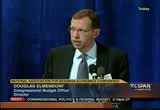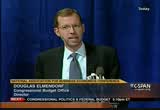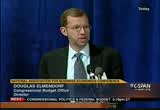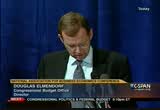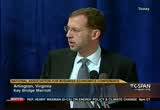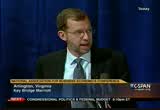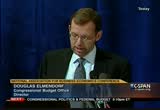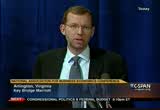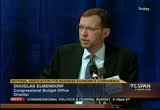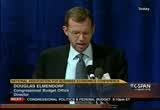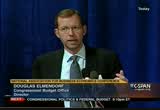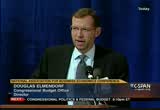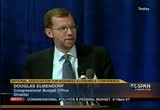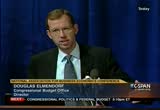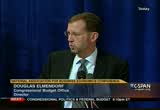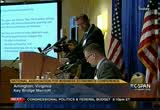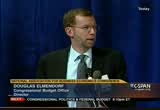tv U.S. House of Representatives CSPAN March 7, 2011 12:00pm-5:00pm EST
12:00 pm
the clean air act which the supreme court has told us on a 5-4 basis includes regulation of carbon. i thought the way the epa has handled putting forth a tailored rule to stop emissions from major sources that make newt improvements or have yet to be built was a thoughtful approach and will be an important coribution to reducing the carbon emissions as best we can until the congress and the american people insist on doing more important key-in legislation, which i think requires at some point putting a price on carbon. >> thank you. go ahead. >> i am from politico.
12:01 pm
uva been talking cut and one of colleagues reported that the energy and power subcommittee will start the markup of that bill on thursday. whatre you going to do to stop it? can you stop the? -- can you stop it? >> it will be hard to stop legislation with which i disagree. i will have to make the argument as best i can. we will lose the vote in committee. we may lose the vote on the house floor. but w're making the argument for the senate anfor the administration and for the american people. passing a bill out of committee and from the house does not produce a law. that is >> we had planned to bring you
12:02 pm
live coverage of the annual meeting of the state attorney general's. due to technical problems, we are recording that meeting. instead we will bring you live coverage of today's white house briefing. we expect reporters' questions on the arrival of the australian prime minister. right now, a look at this morning's portion of "washington journal" on same-sex marriage. >> "washington journal" continues. ho: we are here to talk about the defense of marriage act. we have twguests ,maggie gallagher and brian moulton. how significant is the decision that the president will not to defend the marriage act? guest: we thought we wouldet someone in the courtroom trying to win these cases.
12:03 pm
president obama has declined to dend the law, in part because he is losing these lower court cases, because he is not bringing the best evidence into court. we have been strategizing behind the scenes on how to get someone into court that can intervene. president obama made our job a lot easier. host: the national a court -- organization for marriage is against gay marriage. it was not a suspect -- a setback when the obama administration said it will not keep defending? guest: if they are uble to repeal the defense of marriage act by going to congress, it is unilaterally declared that these
12:04 pm
laws are not defensible. we were appalled by that. on the other hand, it was good news for us, because we recognize the obama administration is not seriously trying to win these cases. host: here is one comment. bria moulton, how significant wasn't that the obama administration pulled ba on this? was it that the obama administration pulled back on this?
12:05 pm
guest: they recognize that the laws discriminate on people based on sexual orientation should be reviewed by courts. wehould not put a rubber-stamp on the constitutionality of laws. on those points, it is a tremendous step forward for our counity. host: a key section is said to be that it is unconstitutional. some of the language makes it harder to defend according to house speaker john boehner. can you talk about that? guest: when the marriage act was passed in 198 it was an ugly thing. it suggests gays and lesbians --
12:06 pm
and they are not a proper place for children to be raised in their lationships. it is not surprising, given the position on gays and lesbians in this country and the way they contribute to our society that they will no longer be able to defend those kinds of justifications. host: maggie, you were shaking your head in response to what he was saying. guest: the rationale that is most important that he is misdescribing is that marriage is about responsible procreation. we have an interest in bringing mothers and fathers together to raise their children in the same family. this is the rational basis for
12:07 pm
our marriage laws. for the obama administration to refuse to acknowledge that that is the purpose of the law laid out is another example of irresponsibility on this issue. the idea that marriage is not defensible as has been in wife is a concern. host: here is a comment. what is the statute in some cases? [inaudible] guest: the portion that defines
12:08 pm
marriage as a man and woman only for federal purposes -- we have to raise that and talk about the discussion. we have some states that have chosen to grant marriage equality to same-sex coles. now the federal government is saying some of your marriages are valid and some are not. some couples are worthy of the federal benefits, rights, protections. there are over 1000 incidents in the code attached to marital status. these same-sex couples are n able to receive these benefits. that they didty wh passed.tdoma whet when doma was it is not about how the
12:09 pm
president feels on marriage. it is about what states are ready doing. host: massachusetts, connecticut, iowa, vermont are haveof the state's debt approved same-sex marriage. caller: i do not think they need to waste their time in trying to defend it. i will make a couple of comments about this. if someone has a gay kid, they must not be good parents. a heterosexual couple having a good -- a kid, so they are not a good parent? you cannot judge a person because of their sexuality you have so many good people that can raise kids.
12:10 pm
the important thing is you have to tnk about the child itself. if you have two man taking care of a kid, trust me, the kit will not know what is going on in the bedroom. i have a sister that is gay. she can watch my kids any day of the week. she will not tolerate them knowing anything about her relationship. they think of her friend as they are not. a -- unt. -- aunt. we are trying to play god. we should not waste our time with this. guest: i think it is right that millions of children in this country are being raised by gay and lesbian couples. child where for air -- welfare
12:11 pm
organizations -- it is almost universally that same-sex couples make good parents. marriaghelps protect families. same-sex couples raising children is happening around the country and many are disadvantaged that their parents cannot be married and those marriages are not recognized fully. host: the idea to make a marriage to have a husband and wife, that their own mother and father loved each other -- it does not imply that a people are not good parents. there are many parents not married in this country and do well by the children. there is scientific evidence -- we do not have a study that
12:12 pm
looks at how children raised by the two fathers with no mother there at all. we have the summer research on lesbian mothers and they look quite encouraging. -- some research on lesbian mothers and they looked quite encouraging. the main point is that -- is not going to waste any of the time of congress. do not worry about that. government will not come to a halt about this. host: i want to take a look at this story in the "washington post" looking at a couple and their daughter. they relaxed at home in
12:13 pm
maryland. they have lobbied a state senator to vote for the gay marriage bill. they talk about how personal appeals are making a difference when it comes to helping members decide how they vote vote in maryland. rsonal appeals from members of congregations that are against gay marriage. how do you see this personal touch affecting the debate right now? guest: it affects it tremendously. at first it was an abstract concept for many americans. now a picture like this of a coup in the paper or goes on television to talk to their neighbor or fellow parishioners, people are viewing same-sex
12:14 pm
couples raising children and making families together and understand it is not fair to treat them differently. they do not want to deprive them of the benefits, particularly in economical times. host: you are more likely to get government benefits if you are not married, but let's put that aside. some states have resisted the republican ray in the last election cycle. richardway in the last -- way in the last election cycle. one person was originally for same-sex marriage changed her mind when she heard from her constituents. the government has no business redefining marriage according to some people.
12:15 pm
host:maggie gallagher is with an association that is against a marriage. brian moulton is with an organization that is for gay marriage. let's hear from our republican line. caller my name is tom. host: we are glad to have you wanted a. caller: i heard the lady say that marriage is a contract. in our county, and in the last census, we have less people here. that is what marriage was set up for, a contract. it used to be that the laws were for the benefit of the producent' so they can
12:16 pm
assets, which are kids. one thing i see that we have done is no fault divorce, which has 50% of the people getting a divorce. so now we are going to go to gay marriage, which i understand 80% of gay couples split. that is going to be a boost for the lawyers. gay couples want to take care ofach other, they can sign a contract any time. but to change marriage is just not right. guest: i am not sure about the 80% figure. i am sure my partner would find that appalling. marriage is the way our society recognizes relationsps.
12:17 pm
there are good reasons that same-sex couples should not have access to the same institution. but a same-sex couple cannot attend all of the rights and privileges under the law right now. you cannot contact and its social security benefits for your partner. you cannot contact or have continuation coverage for your health coverage for your partner or for immigration purposes or file your tes jolly to get economic -- jointly to get in the economic benefits that may come with that. we do not have the same legal protections. that simply just is not true. host: the idea that the w marriage protect children protect not only economic
12:18 pm
benefits is not true. the history and research is that the way marriage protect children is bringing the child's mother and father in a stable union. children's that -- of parents that we mary do not do better than single mothers. re regionmarry d -- remarry do not do better than single mothers. we all have an interest in being together whether we marry or not. host: do you see the defense of marriage act as potentially just that, the government getting involved in people's lives? -- love lives? the federal government
12:19 pm
got involved in the 19th century when the issue was polygamy. this is nothing new. the fact that judges in one state can decide picy on their own, which is what happened in massachusetts. it is not reasonable to say a single ste can decide what the national policy is. host: president obama and eric holder said they would not fend the marriage act anymore. house speaker john boehner said that they will defend it. take a look at what this means. this is from npr. house minority leader nancy pelosi -- a differen a group of house leaders
12:20 pm
will get together and look at this. what do you think may come out of that? because john boehner says he is moving forward does not guarantee an outcome. guest: the voters will call around the office. the speaker does not go to a group to make a decision about what he is going to do. be a 3-2ructured to be3 a- vote. we can guess what the outcome will be. guest: all three members of the republican side said ty would call for intervention, making it clear that they have at least three vote on that panel. host: speaker john boehner says
12:21 pm
he will move forward. guest: perhaps the democrats will make angry statement, but i do not think it will be much of a process. guest: once this gets underway, there are at least nine cases that we have been made aware of in the justice department -- a role in this. it could mean that the house spent a great deal of taxpayer llars defending this issue. [unintelligible] they could spend money on the appellate level on cases going to district court where they deal with discovery and other litigation expenses involved. they're taking on quite a large scale challenge and a costly
12:22 pm
one. they have said many times dealing with some economic and job issues that are very important. host: they haguest: they have ls on staff, so i do not think it will cost that much money. that is not a real issue. host: in the pan , st. charles, missouri. thanks for joining us -- independent line, st. charles, missouri. thanks for joining us. caller: you have hundreds, thousands of cases of married couples that have exported their children. before the civil rights act, blacks and whites were not allowed to get married. when he throws studies out there
12:23 pm
saying that a people are not as efficient as -- at raising children, they are usually brought by a right wing organization or something like that. i do not think that you can just say that it is not true that they have moreights because they are not allowed to get married. if they have a house and the partner dies, they not enjoy the same rights as everybody else. i just do not understand why we are wting time on this subject. we talk about wanting a small government, but republicans want to jump in and divided the country by going after somebody who they candying is unworthy of the same rights as everybody else. host: what is your response, maggie? guest: our classic definition of
12:24 pm
marriage is could and should be defended. many disagree with us. in this case, if john boehner wanted to take this up, it is because president obama decided to decline to defend the law. the house and the senate are given the opportunity to intervene in the john boehner has done that in a quick and efficient in clear way, for which we are grateful. all i can say is that millions of americans do think it matters. it is not about demonizing other people. that is not what we think we are doing so it may sound like back to you. among the great issues of the day, it is important to know
12:25 pm
what the public considers to be marriage. it makes it hard to understand why governments are in the marriage business at all. if it is not about protecting the children, then it is about giving the government this house keeping seal on people's relationships. i do not understand why the government would be in that business? -- business. guest: i think the government has an interest in supporting families. we continue to deny the reality that same-sex couples merit the same support as opposite sex couples do. i do not think it is a radil idea. i would hope that people would be flattered that same-sex
12:26 pm
couples want to be a part of this instituti that we think is very important and what to be a part of it as well. the president's action, i find it interesting that it is characterized as extra- constituonal. when the justice to permit follows the process is laid out in law, giving congress the opportunity to defend -- whether i agree or not as to whether they should be defending, this situation has arisen a number of times over our nation's history. that is even when republicans who controlled just as the promised decided not to defend the law. i do not think it is as quite a major issue. host: a recent story in the ""the wall street journal" looks
12:27 pm
this. lets look at some of the history of the events of marriage back. it was enacted in 1996, into law by bill clinton. that comes to us from the national conference of state legislatures. our guests are brian moulton, a kit for the human rights caaign and maggie gallagher and from the national organization of marriage, which is against it. let's go to albany, new york. democratic caller. caller: i just want to say i do support the gay marriage and
12:28 pm
hopefully things do turnround and they come to some cuent of conclusion -- some type of conclusion. hopefully we can put our brains together and work on this issue. host: both of my guests are laughing and smiling. why is that, maggie gallagher? guest: "put our big brains together." it would be nice if washington would do that. host: next call, go ahead. caller: i do not particularly care if gay couples have t rights and privilegesf a man and woman if they're married. what i do have a problem with is a system being called married.
12:29 pm
it seems that marriage end pride and gomnd husband and wife are traditions for sense -- marriage and bride and groom and husband andife are traditions for centuries. host: ban moulton? guest: every union in this country is a civil union. we call them marriages, but they are a function of the state. but the way that some states have moved really positive in that it does grand the same rights to gay couples, but it is kind of a trap because it is different labeling. why do we need to be put in a box that is little different?
12:30 pm
-- labeled differently? the real significant issue for us is a societal and cultural perspective. but the government right now does not recognizable unions and same-sex couples. states are deciding to do this before same-sex couples. -- to do this for same-sex couples. host: turning to maggie gallagher, chuck wrote in a question from west virginia and asked if you consider civil unions for gay couples to be an acceptable compromise. guest: i do not think it is a compromise. i think it is just a way station at this point. there are forms of civil unions that i could support and some that i would not. and what we found in connecticut
12:31 pm
and califnia is that when you process the same-sex union bill, a gain marriage lawyers say that now means you're laws are unconstitutional i think it has to be carefully drawn. and to offer civilians to opposite sex couples is a really bad idea and will affect our culture. when we talk aut changing the law of marriage, we are not talking about changing just what gay couples doing their private life. we're talking about what our governments going to say in public and is going to say the meaning of the word marriage has now changed. these very words that we used will take on new meaning. and if the goal is social respect, i think you should go to the people and ask for it and not through the courts. host: with go to champaign,
12:32 pm
illinois. caller: i think this whole question is the semantics. i think you should be able to choose. if you are a couple -- a gay couple and want to go to a church to marry you, you should be able to say you are husband and wife if you want to. but what about those thado not want to use those terms? the vernment only got involved in marriage to tax couples. if you have the same rights, you get those tax breaks for children. you protect the children of these couples. that is the most important thing, regardless of what you call it. i have a friend who is gay. hi, chad, in chicago.
12:33 pm
he is a wonderfulerson he is 24, so not married yet. heold me that he does one children one day. he wants to adopt a child that nobody else wants in the foster care system. he is a great person and he will make a great father when he is ready. he does not care what the government or anyone else says about it. he wants protection for his job and his partner and they will call themselves has been and has been if they want to. host: maggie gallagher? guest: i'm sure they will and if they are in massachusetts, the law will agree with them caridad most of the benefits that are directed at children have been separated from marital status. if you are the legal parent of your children you can get tax breaks. i do not want to exaggerate. there are some cases where a gay
12:34 pm
couple will be better of financially if they are married. but there are lots of cases where you are worse off if you are married. you can get health insurance or you could lose your health insurance. i do not want to leave you with a misimpression, whether you are gay or straight. do not think that the government will hand you a checwhen you get married. it is not true. host: the we are also talking about legal rights and to a child. guest: ministates offer the option of -- many states offer the option of adoption of forcing sex couples but not everywhere.
12:35 pm
marriage would change that in many instances. unfortunately, to boil it down to economic advantages and suggest that this what 're talking about a, it is a large package of obligations and responsibilities under the law. and society looking at same-sex couples and treating them with the same respect as opposite sex couples, it is a combination of those things. host: here is a tweet. in recent and "washington post" story about that african- americans response to the pres.'s shift on doma.
12:36 pm
it talks to one woman who had conflicting views of it and she is among the 68% of churchgoing african-americans who oppose same-sex marriage and among the 90% who support president obama. as the black community wrestles with this issue, how do you see the president's role as the commander in chief and his opinion the nation has been very influential? guest: i think it is extremely helpful to have the president of the united states arguing that a flawed as unconstitutional. he has been calling it discriminatory since he came into office and has been calling for its repeal. this is another step forward. and obviously, his voice carries weight with -- carries weight with all sorts of communities.
12:37 pm
the african-american community is not monolithic on this issue. a for instance, the effort to pass marriage equality here in the district of columbia has the support of many african-american churches. therewas a clergy coalition that was led by the leaders of churches in the noreast. and i think there are supporters all ovethe country. but there is a continuing dialogue in the community and all over our country. certainly, having the president weighed in will be helpful part of that conversation. host: the "washington post" says -- the president found a new formulation, he was evolving on the issue as he met more same- sex couples. guest: i do not think that electric doors or other peop are going to be that affected by what the president says on this issue. this is an issue that people
12:38 pm
feel the understand. they are not looking to the president to tell them what to think. it is true that african- americans, like people of all ethnicities, disagree on this issue. but the city council worked hard to prevent the people of d.c. from having the right to vote on marriage and because they do not trust the community here. i am highly confident that if the politicians in maryland pass a gay marriage build up the people will veto it in maryland to just as they did in maine and california. host: let's go to dade city, florida. caller: i think the constitution will prevail. it really is not up to public opinion. if you left it up to the south to decide civil-rights, i think we would see a very different situation. in that regard, the constitution is the one that makes the decision, not public opinion.
12:39 pm
we have that for a reason. it predicts everybody, the minority from the majority. basically, the sanctity of marriage -- you know, women were viewed as property until the 1920's. this idea that it has been eons of the sanctity of marriage is a misnomer. host: let's go to brian moulton and as human rights campaign. guest: i think the constitution will prevail and, related to your comments and in rponse to something maggie just said, it is not to put people civil- rights to a popular referendum. we are sort of reducing this idea is to simply what should people think marriage should mean and they should be able to vote on that. i think we're also talking
12:40 pm
about, how does the state treat gays and lesbians entered would be able to put that to a popular vote, i think you made a very good point that there have been other civil rights issues of historically and if we put them to a vote, we would not be anywhe that we are on any of them. guest: this is the oddest message point that i have ever heard that is okay for politicians to vote on marriage, but not the general people. it is one thing to say that it should not be voted by legislatures at all, and another to say that it is wrong for people to vote on this issue. i would also said the majority of courts as well as the majority of people whegiven the opportunity have upheld the idea that there is not a civil rights to gay marriage. marriage is between a man and wife for a reason. it is not just in this country. the french high court and others of reject the idea of gay marriage.
12:41 pm
steven on the to phone. caller: i have a question for brian. polygamy through history has been a very efficient way of producing children and keeping family life together. i grew up in kenya where polygamy was common and the fathers were very attentive to their children. i would assume that brian would sponsor the red for polygamy to ta place in this country, based on what he has to say. i would like to hear what he has to say. guest: i think every restriction on marriage has to rise and fall on its own merits -- own merits. polygamy is not what i'dork on.
12:42 pm
the reason for keeping same-sex couples out of marriage are highly legitimate. if folks want to push for other changes, then they have to do like i do and get up in front of the american people and defended. host: christopher in manhattan, good morning. caller: it seems to me that this particular issue, just fro observing it, is that the line between the religious feelings of people and the civil rights of people seem to get blurred. we keep talking about traditional marriage. the truth is that marriage has lot of traditions. solomon had several wives. it seems like they want to set the clock in the '50s. i think there are lots of families that need civil protection. host: maggie gallagher? guest: there are lots of families and they all need the
12:43 pm
support protections. they are not all marriages. and there is no reason to treat non marital relationships as if they were. it is no accident that in less than 10 years after the canadian high court established t rights to gay marriage we are now having polygamous in court asking for their right to marry. the same argument can be used. many of these people are responble, taxpaying citizens. they love their children. why not? when you cut marriage off from its roots and the natural family and the sense that we have a common good, whether gay or straight or married or single or childless or notwe allave an interest. it is necessary to bring together a commercial union for the next generation. once you decide that is not what marriage is about the, that it is a demonstration for all kinds of relationships, then it
12:44 pm
changes a lot. guest: marriage is not about a husband and his property, which is what we thought of marriages for many years. marriage is not about only people of the same race. it is not about people only of the same religion. the nature of the rules within marriage have changed. if we have divorce, which was not a reality for a very long time. to suggest that opening up marriage to same-sex couples, giving them the freedom to participate in that common good, which i agree is a common good that we should all respect and promote, it is really disingenuous to suggest that marriage will fall apart. marriage will deend into a sorts of horrible because we allow same-sex
12:45 pm
>> you can see "to washington journal" every morning. we are in the white house briefing room now. >> is the potential for military intervention growing? >> i think that you heard the president just make reference to the fact that we are meeting -- the north atlantic's council, made out -- meeting today and discussing the options that they can take. including military options. i would not characterize the likelihood of further options being pursued as greater now, but as you said in the beginning, those options were on the table and none of them have
12:46 pm
been removed. it is important to take note that there are a range of options that could be categorized as military, including substantial militants that nato could provide in the the humanitarian realm. there was some focus on that today, on the humanitarian aspect. >> the appointment of ground troops, would that be considered? >> no option has been removed from the table. ground troops is not at the top of the list at this point. >> yesterday when the chief of staff was asked about the strategic petroleum reserve, he said that it was being considered but was only used in rare cases. can you explain the president's basic thinking about that?
12:47 pm
what are the factors or positions that would trigger that kind of removed? >> it is an option that we are considering. but there are a number of factors that go into it. it is not based on price alone. it is important to look at history about the times where it has been used. so, i would not look to a price threshold. the issue is -- is there a major disruption in the flow of oil? we're very cognizant of the fact that americans are expererncing a sharp rise in the price at the gas pump, affecting them and their family budgets. we are monitoring that very closely. we are in discussions with the
12:48 pm
oil-producing countries about the various options that are available under the global system to deal with a major disruption, should that occur. ?rish pampa > >> [inaudible] >> i would not characterize it as more or less, simply that he is making the point that it is an option we are considering. within the broader context of the system that exists. >> on libya and the possibility of a no-fly zone, [unintelligible] came out and said that they were
12:49 pm
involved in coming up with a security council resolution for a no-fly zone. is the united states involved in that effort? also, does the president feel that he would need the security council's approval for establishing a no-fly zone? >> well, we are in consultation with our international partners. the no-fly zone option would certainly be discussed at nato. in terms of getting there, if we would want to pursue that option i would not elaborate on the past, other than to say that it is being considered. i think that mr. daly got this yesterday on "meet the press," we need to be clear about what a no-fly zone is, what it entails, and if you were to pursue that option you would want to make sure that it would address the
12:50 pm
need at hand. there are some things that a no- fly zone can do in terms of air traffic. and then there are things that it cannot do in terms of low- flying helicopter activity, for example. that would be much harder to deal with. i think that what the secretary said last week and what bill daley said yesterday was that this option is very much on the table, but people need to very much understand the complexities in the implementation of what it cannot and can achieve. >> this security council -- >> i would say that we are in consultation with international partners. great britain would be one of them. >> following up on that, is the united states working on draft language in the un security council about a no-fly zone in
12:51 pm
libya? >> i do not have anything, jake, but i can only tell you that it is a live option on the table that we are discussing with our partners. >> there were reports one second to go. >> i understand that, but all i can say is that we are reviewing that option as well as other options. another option at nato would be enforcing the u.n. mandated arms embargo. another thing that nato would be involved in. i would like to stress that the military options that we are talking about are not limited to a no-fly zone, but they do include a no-fly zone as an option. >> when the president talks about accountability and making choices, are there any individuals that they have in mind?
12:52 pm
and the individuals around colonel mark khaddafi? >> -- are there any individuals are round colonel metalmark gaddafi? >> the brutalization of his own people, one of the points that we have tried to make is that we are using the full spectrum of our intelligence capabilities to assist us in identifying those who must be held accountable for the actions they are taking. those around colonel gaddafi, making existential choices about being on the side of the people or a leader and regime without legitimacy, they should be aware of the fact that the world is watching what they are doing and they will be held accountable. >> in terms of what has to
12:53 pm
happen to increase the pressure even more a round colonel gaddafi, there were several instances in which he has shown no insistence on stepping down. showing even greater defiance, in fact. at what point with the u.n., reporting that more people had died in the villa, at what point does the u.s. say that now we are going to do something? how many people have to die? how many threats to their need to be to our energy needs? >> jake, i would simply say -- and remind you -- when you say that this has been a couple of weeks already, that is a remarkably short period of time
12:54 pm
from the time when colonel gaddafi was perceived to be, and was, in control of his country to the point where the international community is imposing substantial and punishing sanctions on him and his regime. the international community, speaking with one voice, calling for him to step down and cease the violence against his own people. we are talking about a matter of days and weeks that this has transpired within. i am aware of the ongoing violence. as the president just did with australia, we are again calling on the libyan regime to stoppin the in humane, brutal, unacceptable assaults on its own people. and for colonel gaddafi to step
12:55 pm
aside, as he has lost legitimacy in the eyes of his people and the world. >> i was not -- i was talking in terms of lives. candidate obama spoke with great eloquence about using u.s. forces and the force of the international community to stop slaughter. i was wondering, more than 1000 people have died according to the united nations. how many more until the united states declare that they will arm the rebels or set up a no- fly zone? how many people have to die? >> it is understandable that as we watched the images that we get that show us what is happening in libya, the urgency that we all feel to move and do something quickly -- i would simply say that the international community, with
12:56 pm
the united states, has moved incredibly rapidly to address the situation in libya. they continue to deal with this with great urgency. the meeting today at made out of the north of that the council will be repeated daily this week aspects options are reviewed and considered. again, i would urge some perspective on the speed with which we and our partners have moved in reaction to this situation. i think that comparatively, when you talk about what the president said on the campaign trail, it is instructive. when you look at other events where international action has been required and how long it has taken compared to the speed
12:57 pm
that was pursued in this case, i think that we have moved rather quickly. >> can you confirm these reports that the u.s. is asking saudi arabia to arm the rebels? >> i have nothing for that, no. >> in connection with that, even if you cannot, are there any other countries that the u.s. is asking to provide the rebels? >> again, on the issue of farming and providing weapons, it is one of the range of options being considered. again, we are talking about a matter of days since this situation began. when you talk about arming the rebels -- we are pursuing a number of channels to have conversations and discussions with opposition groups and individuals.
12:58 pm
as we try to learn more about what they are pursuing and what they want, believing that we believe what the libyan people want, a government that is responsive to the people's legitimate grievances and respect their rights. speaking more generally, you have to be very cognizant of -- when you pursue these options -- what it is you are trying to accomplish. i think that it is premature to send a bunch of weapons to a post office box in eastern libya. we need to not get ahead of ourselves in terms of the options we are pursuing. we are reviewing and implementing actions with great haste. >> on the rebels, i know that it is a disparate group.
12:59 pm
has the u.s. had any kind of a coalesced view of who they are? or are they simply very different people with very different motives? >> without getting into specifics on individuals and groups, we are using many channels. diplomatic, the business community, reaching out to those in libya who are working to bring about a government that respects the rights and aspirations of the libyan people. for a variety of reasons, i will not discuss how we are having those conversations or specifically with whom. but we are obviously gathering information and learning about the opposition. on the no-fly zone, you said that ground troops or on the table -- >> what i said is that we have
1:00 pm
not removed and the option from the table. i do not want that to be over- interpreted, i would simply suggest that we are and that the military aspects of humanitarian assistance from being discussed. the no-fly zone is being actively discussed. the enforcement of the arms embargo the u.n. has mandated has been actively discussed. we are now removing any other options. i would point that out. >> ground troops are not the top of the list. is it accurate to say no-fly zone is at the top? >> i mentioned the the three areas that are being discussed today at nato. >> there are reports overseas that saudi arabia has been asked by the united states to send
1:01 pm
weapons to the rebels. is that specific option on the table, asking saudi arabia to send -- >> i would say the option of providing military assistance is on the table because no options have been removed from the table. so, i won't get into the means by which that would occur. i would point you to my comments and response to jill's questions. >> cbs has been reporting a story about gunrunning and mexico. hundreds of guns going into mexico with the knowledge of atf -- there would hope it would lead them to the big fish and it did not work. there are two developments. there is and ig -- an ig investigation and mexico asking for whatever detail. the have a comment on these stories and development? >> i don't. obviously the president pointed
1:02 pm
out money spoke here with president calderon we take issue with the flow of guns south seriously, as the issue of the flow of drugs north. >> are you aware of the specific allegations -- >> i don't know. >> guns went into mexico with the knowledge of atf? >> i don't know. >> on the strategic petroleum reserve, is the price of gas a valid consideration in deciding whether to use that? >> i would say the price of oil is one of the factors that is look at in looking -- making that determination. but not the sole factor. >> what key factor? >> i would say one of the number. >> the numbers below sides choose -- you have to agree you are pretty far apart. the question is, would you guys go for another short-term
1:03 pm
resolution? with biden gone to europe, who is handling the negotiations? >> there are continuing conversation at the staff level by continue through the weekend and today and will continue as of the senate begins to take action on the bills that are on the table, which i think will be an important milestone as we make progress in these negotiations. i would point out that depending on -- regardless of what number you want to start from, we have, beginning with the bill signed last december, which cut $41 billion from the president's 2011 budget proposal, and the baseline upon which house republicans adults -- built their demand for $100 billion in cuts, both the administration and the democrats have met the
1:04 pm
republicans more than half way. at 51 billion and change. we are engaged and will continue to engage in negotiations. we remain optimistic that there will not be a shutdown. but we do not believe -- we believe it will be bad for the economy, have harmful effects if we did this toll booth where every few weeks we are reopening the question of whether or not the government will be funded going forward. i think the uncertainty that creates would be very harmful for the economy at a time when we are beginning to witness very positive signs that the recovery is gathering some steam. we had a positive jobs report number on friday. and i think that we all agree that the last thing we should be doing is negotiations and taking actions that would -- in
1:05 pm
negotiations is taking actions that would reverse the trend of the recovery. we remain optimistic that we can get a deal for a long-term resolution of the funding of government, substantial spent -- spending cuts which the president makes clear he supports. we find common ground, we could get a long-term resolution and move on to the other issue. >> you will do it, right -- >> we remain optimistic we can reach agreement on the full year, fiscal year funding. and i am not going to draw a line here in the san about what we will or won't do. what i will say is it is unacceptable, not good for the economy and therefore a bad idea to set up a scenario where we did disconsolate every two weeks. >> one more question about libya. you said the president wants to send a message to people close to a copy that they would be held accountable.
1:06 pm
-- message to people close to colonel khadafy. paladino they are getting that message? >> whatever broader range of contacts -- we have a broad range of contacts. i will point you told what i did before, you will -- using the full spectrum of our capabilities to make sure that we are aware of the actions being taken by those are around colonel gaddafi so they can be held accountable by the international community. >> said yesterday the no-fly zone is not a video game. people underestimating the potential costs. >> i would say simply it is important to be very aware of the complexities of creating and enforcing a no-fly zone. it remains very much on the table, but everyone involved in
1:07 pm
discussions needs to be aware of what it means both in terms of logistics and the implementation that i think secretary gates talked about last week, and also the cost. again, it is on the table. it is a serious option. but it is literally a serious option. it is not a simple one that you can simply say, snap your fingers and it happens. >> the complexity, the potential to rally the about face supporters behind it -- behind a? >> setting aside specifically military action, we believe it is both true and very important to have it be perceived true that the unrest in libya, the drive to force colonel gaddafi
1:08 pm
from power in the unrest around the region is organic. it is not inspired by the united states or other western or foreign countries. and that is an important factor here in the historical developments we have seen in the last weeks and months. >> in order to not change that perception -- or would it possibly change that perception what the u.s. -- it the u.s. or abroad and some military action? >> i don't want to speculate. as we pursue the options we already enumerated and we wait further options, obviously we want to be as aware as possible about the impact pursuit of those options would have -- both in the immediate effect -- we want to make sure they work in terms of the goal of ending the violence, and we want to make sure that they did not have
1:09 pm
a negative ancillary aspects. >> cratering libyan runways -- and this senator libyan pushed for more it u.s. response -- senator lieberman of pushed for more u.s. response. are they contacting the president privately? >> i don't have anything on that for you. i am not aware of any private contacts between them and present. but we are actively considering the very options those senators are discussing. >> who would hold gaddafi loyalists accountable? >> the international community. i would point out the united states security council has referred this case already to the international criminal court. a >> you listed some of the military options on the table. the no-fly zone. military, humanitarian aid. what other options are there --
1:10 pm
are on the table? >> cui could speculate endlessly about the options. i would simply say those are principles options -- principal options, including contingency planning for no-fly zone. other option is a man on the table. but i did not have a list of them for you. >> following up on chip's question about the gun strategy the atf was running. given the president's strong statement about the southward flow of weapons, would he condone an atf plan that in effect uses guns as bates? >> peter, i did not have anything for you except to point to his statements about his concerns, are concerned about the flow of guns south. but for other questions about
1:11 pm
the story i would refer you to department of justice. >> today's white house briefing is available online at our website, c-span.org. we are going to transition from this event to one we planned to bring it earlier but the state attorneys general. a bare wooden the spring meeting in washington. we are joining it in process. >> nearly universal support from law enforcement, from parole and probation, from the judiciary, from the treatment people, because it helps people -- keeping people out of prison by ensuring they are doing the one thing in those necessary instances people of not to be doing -- that means using alcohol, and now drugs as possible as well, and making sure the consequences of violating the terms of bail or your sends our immediate and they are certain, rather than sending an order to show cause
1:12 pm
three, four, five weeks down the road. it is a program that i think will reduce recidivism and the population of our prisons. and especially for the new members who have not seen the presentation, i know marty will be added to assist at the appropriate time. thank you very much. happy to be here. >> i am eric schneiderman, and i also bring greeting from islands -- manhattan, staten, coney and long. i am very honored to be here in your company back and join you as a colleague. i have learned a great deal already. i think the two areas we saw to address most immediately and the things i felt very strongly as i campaigned for the last year and a half or so really reflects the fact there has been a massive
1:13 pm
loss in new york, at least, and public confidence in central institutions, both the public sector and private sector. ordinary new yorkers and people all over america suffered a lot in the financial meltdown in 2007 and 2008. people are still trying to recover and forced to cut spending on programs that in many cases people rely on. we have an interesting state because we have wall street and we have a lot of people who are as mad as hell at wall street and we are trying to balance that and whether a great interest in our office, participating the efforts -- in efforts to rewrite the rules of the road. and i encourage as the new federal steam emerges, you will find it a lot of additional power has been given to state attorneys general to enforce some of these federal rules regarding financial-services. that is an issue i thought we can address collectively as we move forward.
1:14 pm
the other area where with a series problem in new york is loss of confidence in the institutions of the public sector. a sense of corruption, waste, and efficiency -- inefficiency in government. as we are facing a budget that does it anywhere from $9 billion to $11 billion, it tells us and about the state government is we cannot get a more precise than that with any degree of reliability. but we are trying to create more transparency, for some real numbers on the table. one thing our office has focused on -- because we don't balance the budget. we have focused on the fact that we do believe there are billions of dollars left on the table every year in state and local contracts. you know of great success we have had with medicaid fraud control units around the country. we passed last year the strongest false claims act and
1:15 pm
the united states. this is an act -- for anyone who submit a false claim -- road contractor, you submit to schools, waste hauler -- trouble damages, sultanas -- penalties, clean up a lot of burden of proof issues and i commend to you as something that is good pollock -- public policy and that helps us to been and hard times for our states. recent of a special tax protection units in our office from a group of lawyers dedicated to enforcing the no false claims act. we also included in our act -- it was a little controversial -- tax fraud for the first time. the of somebody commits tax fraud against the state, you can get triple penalties and triple damages and civil penalties. those are a couple of things we have done. we are fascinated to hear about the issues, the changes in criminal justice policy. we do have a long tradition of alternative programs -- drug courts, things like that.
1:16 pm
i am adjusted and is working together to try and make sure we have a consistent system of data collection, because it is tremendously important as we try alternative programs, that we establish which ones work and which ones don't work, stick to evidence based practices and use the empirical evidence to make sure we are directing taxpayer dollars. both are some of the things we are working on and look forward to working with all of you together on each and everyone of them. >> gary king, attorney general fund and mexico. three programs real quick the wood to mention their one is the rule of law program that the western attorneys general of working on. karen white is here. i hope we will have opportunities to address this with attorney general holder,
1:17 pm
to. continue training but mexican attorneys animal. not just western agencies -- greg went down to mexico city with me and we had a couple of mexican attorneys general who met with folks down there. i think the states have a huge amount to give to helping stabilize the situation and help the project in mexico. and we are hoping to get with federal, parts for cooperation. we are working with that. many of you have participated in training. we had all of the country and we appreciate that. we still need your help we think and working with our federal counterparts. secondarily, sort of part of that, i will mention our border alliance to fight money laundering. i am looking forward to working with the ag's from the other states along the u.s.-mexico border to help flesh out that project.
1:18 pm
it is a tool that will help us do a great deal to address the flow of money for illegal activities, if they are taking to is across the border. i know recently i have seen the sale of guns from this country into mexico has been a huge issue. it trying to interdict the sale of drugs and human trafficking across the border, too. thirdly, i had an opportunity last week to argue a criminal case in front of the u.s. supreme court. a a one to thank the 34 states and the best of the columbia -- i want to thank the 34 states and the district of columbia who signed an amicus brief -- whether the clause requires the states and have an analyst to do chemical testing to appear in court. depending on how what comes out, it may be more expensive for the states to provide those
1:19 pm
analyst to travelers around the state and appear in court. we are hoping for a good outcome. the reason i mention it is, one, and the of you who think you might have the opportunity to represent your state at the supreme court, i can testify that it was a great experience and a great opportunity for me to represent the state of new mexico at the supreme court. but it would not have been possible without the help of the nag supreme court products, and dan sweitzer and his crew, and i want to thank dan, for their help. also the other project that they had help me a lot is the fellows project. there were two fellows that helped me. one from the california office of one from the oregon office will attended both that i had done in the nag moot court. i think it is renowned for being one of the best to prepare us for the u.s. supreme court.
1:20 pm
both of those fellows worked with me for two or three days, and i appreciate all of that help from the program. and those of you who are going to be making arguments in front of the supreme court, be sure to utilize the nag resources to help us with the supreme court arguments. >> mike delaney from new hampshire, a pleasure to be here with you this week. one quick issue. i wanted to put a plug in for national sexual assault awareness month that will occur next month, in april. this is obviously a crime that and that's all of our states and has for as long as we have been around. sexual violence certainly impact females, males, and children. we do know it does disproportionately impact women and we released a very troubling report in new looking atast week'
1:21 pm
the prevalence of adult female sexual assault. we sort of peeled back all of these statistics and the crime data. one of four researchers that got ahold of every case failed -- wonderful researchers but got a hold of every case file for a year and look at the case and the outcome. what it told us is it that the rate of prosecutions and pleas of all reported instances of adult female sexual assault was below 5%. that is simply an unacceptable figure. what is interesting is why the cases were not getting through the system, it had a lot to do with a lot of the myths and stereotypes about the victims of these crimes. and so, we really announced an initiative this month to take on this problem, to own this problem, and i think it is fair
1:22 pm
to say that the bulk of female sexual assault as one of the most underreported, one of the most under prosecuting crimes in all of our states. we are trying to build the sexual assault resource and response teams at the county level. i am particularly, from a rural state that has departments that need help. we have been so successful in new hampshire. i know so many of your states have been successful in combating instances of child sexual abuse through the child advocacy center model and which we brought together multi- disciplinary approach is to try to both meet -- approaches to try to both meet the needs of the victims. we are trying to get the same model to tackle cases of adult sexual assault. if any of you are doing that and have tips for new hampshire, we would be pleased to work with you and if any of you are interested in exploring this, i would encourage -- would like to collaborate you. although many of us did not have
1:23 pm
original jurisdiction, if we at the attorney general can get involved in sexual assault awareness month and do something next month, that would be great. thank you all. >> i am catherine cortez and just reelected to my second term in nevada. a couple of things i wanted to talk about. like many states year, we also have a budget crisis, $2 billion in the hole. since 2007, since i have been in office, we continually cut in my office, and just this legislative session, 27% cut in the office, including eliminating 13 positions. that requires a lot of collaboration. obviously there are not enough resources to go around. so to really get the job done and focus on the solutions and issues that need to be addressed in bang my state, it requires collaboration at the state and local level. that is how i address most of my issues that i talked about already and someone to talk
1:24 pm
about now. the methamphetamine problem. that is a collaboration we created at the statewide -- statewide level, that not only has law enforcement on a from local, state, and federal but legislatures, treatment providers, elected officials at the local level to look at substance abuse -- that was a major issue when i took office. it continues to date. now it has more than 2 prescription drug problem. a prescription drug roundups, we have all done. into the new problem and want to talk a little bit about, which is the designer drugs, synthetic marijuana, bath salts we are seeing in our community. here is our biggest challenge. i am curious to see if any other states have addressed this. it's really, that these designer drugs -- to really combat these designer drugs, when our pharmacy board can adopt a regulation to make it a controlled substance, to give
1:25 pm
law enforcement the tools they need to enforce. the challenge -- there are over 500 different formulas for these various and -- synthetic drugs. frost or identify the formulas require the labs -- and we only have two and the state, one in the north and south -- to get the product tested and then be able to identify its and put it before the pharmacy board through the regulation process. by the time would go through one process, there is another form a lead that comes along and another drug that is out there. i am curious if any other state has looked at this and how to address this and any kind of legislation to tackle this ahead of time so we can really stop these synthetic drugs, designer drugs, from being out here and the hands of unfortunately a lot of the kids in our community. that is one issue. the other issue is mortgage fraud. not everybody is dealing with this. let me put it in perspective in nevada. beside our $2 billion budget deficit we have a 15%
1:26 pm
unemployment. we of the highest foreclosure rate and bankruptcies. -- we have a highest foreclosure rate and bankruptcy. fraud is out of the woodwork. so much fraud occurring in the state, particularly the mortgage -- mortgage side, that made me create a mortgage strike force for the civil and criminal side. no longer simple cases but complex cases. when we see a thought that comes in, like foreclosure rescue scam, it now involves identity theft, prostitution -- believe it not, blood diamonds from africa. child pornography. it is unbelievable. it really tax our resources. again, requiring us to collaborate in the local, state, and federal level. and we continue to work in that area. one other issue -- domestic violence and sexual assault. one of my primary issues also when i worked in the office.
1:27 pm
another bad statistic for nevada. i hate to keep throwing this out. nevada leads the nation and the number of women murdered per- capita as a result of domestic violence. so, we were collaborative lee, state-wide level, working with advocates, law enforcement, treatment providers jeep y to get thee bell grants that, and,. one area i am proud of -- we have rural communities in the states, not a lot of prosecutors that can address domestic violence because they are inundated with other cases. we created a project with federal funding. i hired a prosecutor in my office and i put them with three counties in the rural community and he works with the d.a.'s in those three counties and work the cases under each one of the
1:28 pm
district attorneys. it has been a phenomenal project, so well done that we actually got a second grant for funding for another try-county project in our rural communities. one last thing i wanted for about their -- when i first took office, nag had been so is the mental health and a particularly on the administrative side. i sit next to sitbrunning, of nebraska, when it first came to office had nag do it internal assessment of his office -- deficiencies, programs, and nag was able to help me put together a team that was attorneys from other ag offices -- colorado, utah -- came into my office, did a complete assessment, survey of my staff, and put together a report before me, a blueprint on how other offices are running and how we could be a little more efficient. we are now finalizing that blueprint.
1:29 pm
and it is a great opportunity, if you so choose and nag provide that, to have them come internally and administratively look in your office and see if there can be found a more efficient ways of doing business and synergy. it is a great program. finally, a look forward to meeting all of the new a g's. i know i have not had a chance to meet a lot of you yet. and to buy existing colleagues -- thank you very much. it has been a wonderful four years and i look forward to another four with all of you. >> good afternoon. steve bullock from the island of montana. and send you the warmest of greetings. a couple of issues i have been working on. one is repeat offender dui. montana continues to lead the country and probably the most dangerous highways as far as casualties per mile traveled as well as population.
1:30 pm
interestingly, last year, we saw a 10% decrease in first time dui but 40% increase in felony dui, four and above. general wilson says sometimes you pick the issue and some sound issued picks you and this picked me prominently just right after i got into office when a 28-year-old veteran trooper who led about the third of our state in dui arrest was hit by somebody with 8 pints, four shots -- driving with his lights off. as a general said -- look into what this 24-7 program is. it is pretty simple from the perspective. starting pilot program without legislation -- administered 8000 test and ended up with a 99.90%
1:31 pm
compliance rate. it has passed one house of our legislature almost unanimously. i think it does make a real difference but also been doing work with aggravated dui. we know most fatalities are 0.16 and up. trying to pile up -- pass aggravated dui legislation. prescription drugs. that is something we have been working on quite a bit as well. i think ultimately as with any of these challenges, the combination of education, enforcement, and legislation. education-wise, we know 80% of parents talk to their kids about alcohol and marijuana and less than a quarter about prescription drugs. is trying to change that with psa's, advisory council. i suggest looking at and visibleepidemic.com. that is our website. we are into schools. taking back and escalate in
1:32 pm
poundage for our operation medicine cabinet, 2,500 pounds so far. we also set up a specific pill taskforce, investigators and a prosecutor out of my office that will go anywhere in montana and and take any cases the local press kit -- prosecutor would not want to do. legislation is also a prescription monitoring program. we don't try to pass anything that has the word monitoring in a state like mine, but prescription registry -- fell two priebus late of sessions. so far it passed 85-15. real world example, working at a case of a 26-year-old woman, 25 different doctors in seven communities around the state. one time around, making that trip to see them all. 832 miles.
1:33 pm
see literally pulled her caps off of the teeth to get medicine. clearly we have addiction problems but we have told- seeking opportunities in all of these states did not have prescription registries and hopefully the next step is to make sure we can work with all of the neighbors and states so that we can share information because we have told-seekers coming up from wyoming because they have a registry -- pill seekers coming up from wyoming. other things -- i am happy to share additional information as a week goes on. >> chris from missouri. good to be with all of you again bear the one of the issues we have had a chance -- the last four or five months has been the issue of domestic violence. if you haven't had a chance over the last three, four, five years to take a group of stakeholders out around your state and conduct hearings on this topic,
1:34 pm
and offer it up for your consideration. first off, it was surprisingly embraced by the public, the media, the attention these hearing groups receive in each town that we went into was gratifying. the findings were not surprising to anyone. i would assume they would be the same that you would find in your state, that is, the scope of the problem is surprisingly large -- 59,000 reported cases last year in the state of missouri. and avenues of assistance are frustratingly small. for every two women who gathered up children, packed bags, and saw shelter in domestic violence shelters across our state, there were three women who were turned away. for every two women who left that night to find shelter, three women left that night and returned away because there are not enough beds to assist in this problem.
1:35 pm
the report that was issued was a report on best practices within the law enforcement community, in addition, reorganization of state law being embraced in a bipartisan way for a group like ours, a bipartisan group. if you have not been out to have a chance to survey this issue in the last half-dozen years, i think it is very timely across the states. and the legislature is very quickly moving these suggestions forward. >> jim would have from mississippi. -- hood of mississippi. in the area work in the most is policing the internet. i was assistant ag back during the tobacco wars and i know what attorneys general and that era did and what impact they had on public health in the united states. i see policing the internet as possibly an area where we can have the greatest impact.
1:36 pm
as someone said this morning, i --nk air act, the internet's i think eric, that the internet is the crime scene of the 21st century. particularly in the area of crime -- child pornographer -- child pornography, rescuing children. profiling those. picking and choosing to see who we go into rated first. we are trying to pick out those who are more likely actively molesting a child at the time i thing that is one of the greatest rewards i have going into that office everyday, know when the 17th floor has a cyber crime unit in which we are rescuing children. another area that is challenging involving the internet is education. the education element. we attorneys general can provide in the area of cyber bullying say is the -- safety board will have little girls, 13, 14, 15-
1:37 pm
year-old sending new the photographs of themselves, which is a felony in mississippi, five year minimum sentence in a penitentiary, 40-years max. we cannot prosecute our way out of it. what we need to do is do more education vetted what i have done it is gone into the schools and try to educate the children as to the dangers, and the fact they are committing crimes. as well as the parents. so we are trying to do an outreach effort to educate on those dangers. my fear is that in 10 years, we may look back and wonder what were we thinking when we unleashed this electronic arise that our children are under. i have a 15-year-old daughter, 12-year-old son and seven-year- old daughter. the girls are just under attacked from the most popular girls in school, being run down by girls, and those not as popular, rundown for the same
1:38 pm
old reasons when we were in school. it is just that the anonymity of the internet have provided an avenue for power just to attack one another. i hope we don't look back in 10 years and say, what were we thinking? have we had a psychological impact on our children when we unleashed this electronic garage? another area in which we have been very active dealing with internet, berrigan, intellectual property theft. i and our co-chairs what the panel tomorrow to talk more about what we have been doing it as a committee in that area. particularly in mississippi -- we got a grant. we were the only to get a grant. it actually worked. oftentimes i say that we get grants from doj because the guns that in mississippi because of the size, number two, and number two, they say if mississippi can do it, everybody
1:39 pm
else can. we have been successful working with federal agencies. in one day we hit 28 -- called mexican bodegas, basically a grocery store, and store,viagra -- having a lot of fun with that, cannot get a witness as to whether it works. we found also a lot across the ocean drugs that will be sold without prescriptions. from painkillers down the line better dangerous to our citizens. it is a consumer protection issues. and we have been active in bang that area. we have been trying to do the education component of that is well to educate about illegal download of music and software. working to try to implement policies that will help them better use their bandwidth rather than allowing students to download movies with that band with and how we police that bandwidth.
1:40 pm
there are a lot of areas for us to work in the area of intellectual property. another area we have been active in in mississippi is domestic violence, as been mentioned here and by several of my colleagues. we found that in mississippi we were the fifth worst in the nation for incidents of domestic violence homicides. by some of the programs we have implemented and working with the legislature, we have now moved over a fe-year period to number 23 in the nation. hofully we will continue to move. the second thing one to mention is the concept of -- what we talk a lot about, the mortgage fallout. but one specific thing we have done before -- that is very labor intensive but concrete. if you want to develop a relationship with your cities and towns -- our abandoned housing initiative. we work with the cdc and the mayor of the city where
1:41 pm
properties have been foreclosed and abandoned. a lot of times the title is not clear and it is an eyesore and all of the things that happened with the broken window. -- we come in and work as a receiver. we've petition for receivership. although they do it one by one, it has really caught on steam. i spent last week in wister and we found owners who want to come in and buy the property. if you get a couple people in your office and want to try it as a pilot, a great way, a visible sense to show that there are some things you can do about foreclosures. you want them back on the tax rolls. and frankly, you want to be able to get people in a neighborhood to realize that day can stop the property values from going down hill. if you are interested i would be happy to put you in touch with
1:42 pm
1:43 pm
>> the national association of attorneys general gathered in washington this week for their spring meeting. by the way, you can see earlier remarks and opening comments later on the c-span networks and of course online at c-span.org. they are set to resume at 2:00 p.m. eastern. we will continue our coverage at that time.
1:44 pm
that discussion will center on election law. live coverage at 2:00 p.m. eastern here on c-span. the prime minister of australia is in the u.s. this week meeting with president obama on trade and security issues. she made remarks to congress -- or she will make remarks during a joint meeting this coming wednesday and we will have it live here on c-span. after today's conversation the president, the two sat down with the media and took reporters questions for about 10 minutes. >> the prime tester, who i had a chance to meet -- prime minister who i had a chance to meet during the g-20 summit and was immediately charmed, as i am sure a good chunk of the australian people are. we have no stronger allied and
1:45 pm
australia. as we celebrate the 60th anniversary of our alliance acted as a special inappropriate to have a prime minister gillard here. you will be speaking to a joint session of congress, a high honor reserved for only our closest friends. i think a measure of the greek to which astrakhans are held to such height -- i think in measure of the degree to which australians are held to such high esteem. we share so much. a shed -- set of shared values but also a set of shared open spaces and a pioneer spirit. as the prime investors said the first time we met, it is what . kes us great maketes we have had a very useful discussion about a wide range of issues. we began by me once again expressing on behalf of all of
1:46 pm
the people of the united states our the best condolences for those families that were affected by the terrible floods for recently. we want to commend prime and mr. gillard, government, and all the personal -- personnel involved in the timely response in which i know is a difficult time. and we want to pledge any support that we can provide to the australian people in this moment of hardship. we also talked about a wide range of international issues. i will be traveling this year to asia once again for the east asian summit. and will be hosting an honolulu the apec summit. australia and the united states have a shared interest in expanding trade in the pacific region and promoting clean energy and making sure that we
1:47 pm
don't have regulatory barriers to prevent our businesses from working across our borders. and so we are very excited about the prospect of joining forces with australia and other countries to promote growth and employment in the region. we had a good discussion about security. and i want to once again thank the australian people and the military families making such extraordinary sacrifices in afghanistan. it is not easy. australia is our largest non- nato coalition member making an extraordinary contribution day in and day out. and i want to personally thank prime minister gillard for her strong endorsement of our efforts there. and we discussed the fact that 2011 will be a year of transition in which we more and more provide the the assistance
1:48 pm
necessary for afghans to take the lead in that effort. and we had discussion about the situation in the middle east. acting prime and esther gillard and i both share a very firm conviction that the violence that has been taking place and perpetrated by government of libya is unacceptable. australia joined with us in imposing swift and firm comprehensive sanctions against the libyan government. we continue to monitor the violence there. i want to send a very clear message to those who are around colonel gaddafi. it is their choice to make how they operate moving forward. and they will be held accountable for what ever violence continues to take place there.
1:49 pm
got natoantime, we've as we speak consulting in brussels around enlarge set of options, including potential military options in response to the violence that continues to take place inside of libya. in addition, we have taken the lead on a host of humanitarian efforts. and i just authorized an additional $15 million that will be provided to aid organizations that are already on the ground and coordinating with the united nations that already has a number of personnel on the ground as well to insure that people likening the help that they need and in a position to respond to any additional emergency that may arise out of the situation. the bottom line is i think australia and the united states stand shoulder to shoulder in sending a clear message that we stand for democracy, we stand for an observance of human rights, and that we send a very
1:50 pm
clear message to the libyan people that we will stand with them in the face of unwarranted violence and a continuing suppression to -- of democratic ideals we have seen there. because of these shared values, because of the deep and longstanding eligible to between our two countries, it is my extraordinary pleasure to have prime minister gillard here. and i have to say that from a distance, at least, she is doing an outstanding job, is a very quick study, and we look forward to -- since she is a former minister of education -- visiting a school in washington, d.c., we expect this marston's of their to ask all kinds of difficult questions -- we expect the smart students over there to ask all kinds of questions and i know she will give them good
1:51 pm
answers. >> i would like to say thank you to president obama. i am terrified of how complicated the questions from these students will be. i want to start by saying thank you very much for the warmth of your welcome here and i am very delighted to be addressing congress. i know this is an honor for australia and something that we are very pleased and grateful for. so, thank you very much for that. we have been talking today about the friendship between our two countries, about being great mates, the 60 anniversary of our alliance. 60 years young. there is so much more to do in the future. including cooperating as america -- including cooperating in our region and the east asia cement and beyond. i talked to president obama today about preparations for the g-20, about its continuing
1:52 pm
importance in keeping the focus on growth and jobs in the future. and we talked about the importance of trade it, both the trans-pacific partnership where, under president obama's leadership we are hoping act apec to see major progress and the doha round where we hope to see major progress this year. we have the opportunity to talk about the fight in afghanistan. it is hard, but it is something i am also very personally committed to to say mission done and to ensure that we play our part to trained afghan national army and bringing security to afghanistan so the afghan people can lead their own security. we had an opportunity to talk about transition today as well as events in the middle east, as the president has outlined. it has been a very great pleasure to be here. thank you very much for these discussions. i know -- the full range of
1:53 pm
economic discussions, military discussions, a defense cooperation, the mission in afghanistan, public policy issues which are nations share -- education, which we will have an opportunity to talk about the school -- climate change, we will continue every strongly in the future. thank you. >> thank you very much, everybody. thank you, guys. thank you very much. thank you very much, everybody. thank you very much, everybody. i would love to -- looking forward to a return visit to australia. the first time i was there, i was telling the prime minister, i was 8 years old and had a wonderful time in sydney. everybody treated me wonderfully, and i hope i get a chance to get back there some time soon. thank you.
1:54 pm
>> that congressional joint meeting with remarks from the prime minister of australia will be this coming wednesday. you will be able to see it on c- span. it the u.s. senate is just gaveling in. they will turn to the biggest patent law in decades. later this week, test boat -- votes the democratic federal spending plan. you can see the senate at 2:00 p.m. eastern on at c-span2. tonight at 8:00, republican president of candidates address the why of faith in freedom coalition. they include newt gingrich, tim pawlenty, and former senator rick santorum. live coverage on c-span at 8:00
1:55 pm
p.m. eastern. we are back for coverage of the national association of attorneys general, convening their spring meeting. this next panel will look at election law. live coverage on c-span. >> we are going to begin a. they will be in here in a minute. the next panel deals with the area of election law. will ask you guys if you can
1:56 pm
break it up over there and let's get to our seats, ok? attorney general rob mckenna introduce our panel. we will leave time for questions, because this is a broad area of the law and we have a different functions in our states regarding election law. if you will have the opportunity to ask some questions. i will turn it over to general mckenna. >> general cooper, thank you very much. i am very pleased we have such a distinguished panel to talk about the state of campaign an electionclosure an, law topic that is being
1:57 pm
litigated in our states as we speak. when i ran for office, i never imagined that during my tenure -- i am in my seventh year as ag -- how much campaign finance disclosure law could change print one of the supreme court cases i was privileged to argue said on whether it signatures on ballot measure conditions are public records or not. that matter continues to be litigated even though we prevailed at the supreme court. much more famous than that is the supreme court's decision in citizens united, which found that certain restrictions on corporate political expenditures violated the first amendment. , the supreme court also concluded, however, that the disclosure of money in politics is a crucial part of the election process. the first amendment protect political speech and is closer permits citizens and shareholders to react to the speech of corporate entities in
1:58 pm
a proper way. this enables the electorate to make informed decisions and give proper way to do different speakers and messages. since the citizens united decision, a number of states have enacted statutes that permit corporate political expenditures while also providing for disclosure of that political spending. these laws, as well as other election-related disclosure rules, are subject to their own cases. very few of our states have been immune from such litigation. the following states are involved in challenges federal courts, including oregon, hawaii, arizona, montana, minnesota, florida, maine, wisconsin, washington, and others, as well as local jurisdictions like the city of the san diego and the federal government itself and through the fec. the subject of these suits include disclosure of the soldiers, contribution limits, how to regulate disclosure --
1:59 pm
disclosure threshold, contribution limits, how to regulate disclosure, the level of disclosure required, traditional campaign restrictions on how our panel today will discuss the current status of campaign disclosure law, including the entities in the electoral arena, such as pac's, not profits, 527 organizations, at the different state and federal roles of each. will discuss the recent decisions, including the citizens united, and address the disclosure law -- that have addressed the disclosure laws in context. we are very lucky to have two experts in this field to share views with us today. allison a word is vice president of policy at the center -- alison a word is a vice president of policy at the center of competitive politics. she has been a law professor
2:00 pm
and was counsel to federal election commissioner brad smith. share rights and f -- she writes and speaks frequently on these issues. another panelist is at the burn center, where he works on a reform measures are around the country. as many professional accomplishments are written up in your materials not go before he worked for the brennan center, he worked for the eight -- his many professional couples with are written up in your materials. before he worked for the brennan center, he worked for the aclu. we will talk about the constitutional background for the current law, and discussed current litigation pending in some of your states. it will also discuss washington's experience with challenges to the disclosures that it, including the stress it puts on our clients' budgets as we litigate seemingly endlessly on some of these issues. i anticipate that our panelists
2:01 pm
will have a frank and candid exchange of views, and we encourage you to ask questions following their presentation. that's began. allison, we've decided you are going to start? we appreciate you coming up. we will have this going for you as soon as i set it up. when you start? we will fix it. -- why don't you start? we will fix it. >> all right. i am with the center for competitive politics, which is abbreviated on my knee attack as -- on my nametage as ccp. with one more c we could be the soviet union. my colleagues don't find that as funny as i do. disclosure in particular burdens protected liberties and is not a no-brainer when it comes to deciding how to litigate.
2:02 pm
sometimes that burden is intentional. oftentimes is not. the spotlight as publicity, as i say, is valued at not just for its light but for its seat. the government controls more and more information and it becomes more and more available to a state, intentionally or not, to sanction his favorite expressions simply by requiring that activity be disclosed -- sanction disfavored expressions simply by requiring that activity disclosed. post-citizens united, post- denial of certiorari in speech now, the constitutionality maybe not all to your state's laws. to yourr -- may be novel state passed a law. the disclosure law has to be supported by a governmental interest. sometimes that is described as important -- it is not
2:03 pm
compelling but not -- the interest that the court has recognized -- let's call it is sufficient governmental interest, because i don't think the semantics are all that important. it is more the concept. the anti-corruption justification always works. it works in first amendment and core speech context to the extent that disclosure is some doubt subjected to slightly less rigorous scrutiny than that. it is a good interest to evoke. information to the public and to voters is an interest for the government to pursue. you want voters to understand who is lining behind certain ballot propositions if you have them, or candidates, or other issues, and disclosure of the supporters of the candidates or supporter of a ballot measure committees helps eliminate that. finally, there is enforcement
2:04 pm
that disclosure -- the aid that disclosure laws can offer to enforcement brought the political system is more transparent. maybe you don't identify, but your state agency does not identify that there's something wrong with the disclosure or relationship, but the public knows these people better than you do and can say something, can file a complete, it usually the avenue through which that is exercised. in addition to supporting a sufficient government interest, your disclosure law passed be tailored to serve that interest. cannot give up antitrust interest and an advocate on behalf of -- you cannot devote and addressed interest and an advocate on behalf of law that does not do anything about that corruption or give the voters information. thirdly, political disclosure laws, historically subject to a
2:05 pm
larger sort of disclosure transparency metric of constitutional law, seem to be a somewhat easier to implement by states and by the federal government and other forms of disclosure laws. this gets us to what the state interest is the ticket as being. and interest and a political transparency -- an interest in political transparency is easier to argue in court and that disclosure of religious preferences, because the judges will scratch their heads -- why? what is the interest in telling people to have religious preference, especially since people might never religious preferences they want to keep -- might have a religious preference is the one to keep private. or prurient interests? various types of adult entertainment have been protected. he might in a large white think of that as a corruption interest, but -- you might in a
2:06 pm
large way think of that is a corruption interest, but the courts don't see it that way. those are examples of a place where the state interest is really hard to present in a convincing way. therefore, what about the disclosure law is, the tailor and aspect comes out. look at some examples of cases that if upheld or not upheld political disclosure. we have examples from the south in the 1950's, where various state actors were trying to get information about activities of civil-rights activists. and the naacp alabama, you have a case where the state has a foreign corporation registration requirement. and in pursuit of that, the states as we want to know what the naacp membership looks like, because we think they are a foreign corporation and not comply with corporate law.
2:07 pm
ordinarily he would say -- ordinarily you would say that the state has an interest in controlling corporate activity in the state and has a lot of power over corporations, but not this time. there is a protest going on there. the membership of the naacp in alabama is a sensitive thing. it is more like the religious interest or medical interest than your ordinary, practical, day to day political interest. courts look at it and said we think you're a corporate law enforcement rationale is really a pretext. you don't have a lot of good will with us right now. we have a new disclosure law, it applies to political parties, and the socialist workers party says with a second. our workers get monitored by the fbi, our members get trashed by their neighbors. it nobody wants to be a socialist workers party member in a public way, which is
2:08 pm
interesting that you could have a political party filled with people who don't want to be affiliated with it, but that is a side issue. in your case, you have shown convincingly that disclosure is going to harm the associational interest. the fact that the social workers party is largely ineffective in this party is not absent from that opinion. where is the corruption, maybe, the court is saying. where is the interest in a voter information. you'll probably not be able to do anything and why no. in doe v. reed, in general, disclosure is permissible, but not here. in citizens united, maybe the denial of certiorari, although i am loath to take on cert dials,
2:09 pm
because you generally should -- but serves these good public interests, and to the extent that their interests that are more important than disclosure, in fact arbitrated by having disclosure, we will take those as we,. it will take a look at the socialist workers party pattern or the pattern working its way through federal court again, because you might have an experience that is different from the public. i think, too, it is unavoidable, it seems to me, when you look at the legal record, that what you are looking at is a place where the zeitgeist and popular opinion really do it for my son disclosure is upheld and why some isn't. -- really do inform white some disclosure is upheld and some isn't. when you're looking at recent
2:10 pm
disclosure laws, especially -- there is a terrific article, not just because it is long, but it treaties, the university of pennsylvania law review, and the title of it, which you will need it now that "theahve the site -- tension between privacy and disclosure in constitutional law." history can provide an object lesson in what not to do not go and the fact that -- history can provide a not a lesson in what not to do. it is that necessarily mean that your office gets a pass to argue against popular characters in the modern times.
2:11 pm
it your goal is to evaluate and then a state law s. you will have new, novel approaches to disclosure to defend. looking in my crystal ball, they are going to recall about issues of attribution and issues of coronation. -- they're going to recall for issues of at tradition and issues of cordish and. if you had a group that collects money from other entities, and then you go out and do something political with your private money, when is it a proper to attributed that money to particular donors -- when is it appropriate to attribute that money to particular donors? if they do want it to go by an advertisement against selling soap or for someone so, attribution seems pretty clear -- against so and so or for so- and-so, a tradition seems pretty clear to when there is not regarded all to what the agenda
2:12 pm
might be, at tradition is not so appropriate. they may not even like what the trade association did with the money. to associate the source with the communication is to provide it disclosure that is inaccurate. i cannot sue any state interest, --, it that cannot search -- any state interest, can -- that cannot serve any state interest, can it? it is jump disclosure. maybe we have died junket disclosure in some of these very, very aggressive -- we have junk disclosure in some of these very, very aggressive referrals that serve the interests of censorship. i will handed over to mark. .k, terrific, thank you p >> any questions at this point?
2:13 pm
>> take him at the end. ok, i can take one and now. >> can you give an example of junk disclosures? >> no proposal anywhere would be the extreme when i prepared in my mind to illustrate the points. there are some disclosure laws that two-year look-backs, and i'm not sure what the justification is that. two years previous to an expenditure -- who is even attuned to what might be the trade association's particular political priorities? two years in it? in the disclaimer arena, similar to what is altered in the federal disclose laws, and i've seen a state law us about this, where you not only put the identification of the source,
2:14 pm
but you have some executives "hi, my source saiy name is jack walsh, and i am blah blah --" who? i thought the standby stuff in mccain-feingold was marginal, but this is really -- who knows what that guy looks like? why would that be helpful? it takes a lot of time. anyway, those are my two. >> other questions at the moment? we will have time for more questions. thank you very much. appreciate it. you are up. >> hi, i thank you for having us. the brennan center has been working with a lot of your states, sometimes as amicus council, and sometimes representing interveners who are
2:15 pm
trying to defend a state election laws. i am thrilled to be here now go before coming to the brennan center, i was representing homeowners in queens county, new york, which was ground zero for the foreclosure crisis that is still ongoing in new york city. it is a thrill for me, because i know that that community has really benefited and appreciated all the leadership that the folks have provided on that issue. a december but has a powerpoint, but i am going to -- i guess everybody has a power plant, but that there tha -- but rather than grinding through that, i will cut to the chase a little bit. if anybody would like to fly and do the old dog and pony show, let me know as well. really, in terms of the current disclosure laws, it does start with the citizens united, which
2:16 pm
we all know about. citizens united at it, to some degree, helped to increase the amount of money spent in politics. there is a chart that public citizen put out that show some money has been going up, especially spending by outside groups. and according to public citizen, at the outset spending in 2010 was four times the last midterm election in 2006, almost two times what was spent in the 2008 presidential election. the trend was going up but for citizens united. we do not want to blame citizens united for everything under the sun, but it has allowed a lot more spending to come into these races brought the good news for disclosure proponents is that, -- to come into these races. at the good news for disclosure proponents is that if you look at justice kennedy's majority
2:17 pm
opinion, it's free speech and a disclosure as going hand in hand. he saw the benefit as it promoting a free speech, getting voters more and more information from anybody who wanted to opine during an election, and at the same time, more robust disclosure what would make sure that voters were more aware of who was speaking and help them to evaluate those messages. at in addition, there are other interests that the courts have looked at over the years at disclosure in terms of a fighting corruption and preserving the integrity of the electoral process. the bad news for those of us who are sort of a fighting for more robust disclosure of money in politics is that citizens united sort of overestimated what is sittin -- what existing disclosure laws look like and did not estimate what all the changes it would create would have a huge, and intended impact
2:18 pm
on what law of what looked like pre-citizens united. a lot of that went through pac's, and would register at the federal level with the sec, and state law has their own requirements that is often similar. pac's meant that people would know what money was going in and out during the course of the election season. in addition, the nonprofits are running advertisements during election campaigns were down as 527's. moveon.org or, as with boat veterans for truth -- swift boat veterans for truth. again, those organizations would be reporting to thei -- reporting their contributors and a publicly available reports filed with the irs.
2:19 pm
what happened after citizens united is that any corporation can now run those kinds of expenditures. that includes for-profit corporations. what it was the means is that a lot of nonprofit corporations are jumping into the fray, and those are generally organized under 501 (c)4 of the tax code. they are not disclosing their underlying donors. if you ask the average american who bothers to think about citizens united what they think the focus on the big for-profit corporations and money in politics and that sense -- for an amicus brief we submitted in minnesota recently, we went back and looked at the public reporting that was going on. the targets and best buys are not organizing political committees or fines or running these expenditures on a round. what they are doing is good to
2:20 pm
bring money to nonprofits, and in minnesota, -- what they are money is contributing to these nonprofits, and it is those nonprofits that we're focusing on it to improve the disclosure of money in politics. the concern is making sure that those organizations are transparent in a way that the organization making expenditures for citizens united were transparent. just to illustrate this, one other chart i threw in is another thing from public citizen showing the top 10 outside groups that spent money on the 2010 election cycle. according to their list, they say that only three of those top 10 group baxley disclosed their founders -- only three of those top 10 groups actually disclosed their funders. american crossroads was
2:21 pm
disclosing their contributors. it was registered as an independent expenditure committee with the fec, and that case held that independent expenditure pac's cannot be held to the normal contribution limits, where as it was previously a federal pac, like american crossroads, would be limited to $500 contributions, and now they have an unlimited threshold. if you go down that list to number four, american crossroads is also organized with a group called crossroads gps. only the five had a 27 is disclosing its donors -- only the 527 is closing its donors. >> do you want your slides to show up? >> i think it was the last slide that was going to be
2:22 pm
informative. oh, and summit, i apologize. -- oh, i'm sorry, i apologize. maybe in the interest of time i will keep going. if anybody wants to go back over anything, i would be happy to do that. all these examples we give end up in partisan issues. while the republican party was, i think, doing most of that kind -- "politico"7 reported that the democrats are setting up their own organization. it is something we will be seeing on all sides of the political spectrum going forward. in terms of the issues that your offices are going to be seeing, there was a couple i wanted to flag that we're seeing and a lot of litigation.
2:23 pm
the first would be one of the issues that allison was talking about, which was the disclaimers. maybe my answer to the last question, perhaps in defense of the disclaimer, is that oftentimes the entities that are put together to fund these ads have names that are on informative. littleton neighbors voting no spent to defeat a local zoning measure in colorado that would affect whether or not wal-mart could move to tout. -- to town. it was entirely funded by wal- mart. the reason for this climate is to make sure that when an organization is set up to put this -- for the disclaimer it is to make sure that when an organization is set up to put these advertisements out, people the who -- people now who is
2:24 pm
funding the ads. it is useful information that can help voters make decisions. we advocate that if littleton neighbors voting yes is only funded by target, we want to get that out there. you want to make sure it is as not to send an issue as possible --. we want to make sure it is as non-partisan an issue as possible. the other set of issues is what we think of as entity-based disclosure issues. a big wave of litigation in 2010 occurred when a number of states, in order to address and the citizens united issue that i described before, where a lot of new entities are making political expenditures, a number of states went and took -- for example, 24 states have some sort of a ban on corporate and/or union expenditures prior to citizens united.
2:25 pm
since that time, at least 11 states have enacted legislation to amend those laws. probably the most prevalent strategy was to amend the law to permit expenditures but then to require organizations making those expenditures to in some way, shape, or from all political -- or form of all the political committee reporting requirements. any corporation that may political expenditures had to file a report with the state and had to up some sort of a fund entirely under the control of the corporations, and could be just an accounting measure that had a spreadsheet showing here is the money we are allocating to political expenditures and here is where it is being spent now you had it up some sort of reporting that would be analogous to the anti-wide reporting for anybody making this -- expenditures e -- entity-wide reported for anybody making these expenditures prior
2:26 pm
to citizens united. basically, arguing that political committee requirements were overly burdensome, that they interfered with the rights of corporations to engage in free-speech. detention at the heart of the citizens united on this issue is -- the tension at the heart of citizens united on this issue is that there was broad language supporting disclosure, but there was talk of how burdensome pac requirements are and that they are not an adequate substitute for corporations that want to in the thai politics. not -- tensio -- they are adequate substitute for corporations that want to engage in politics. the good news from our perspective is that they have not been successful. as far as i know, all the
2:27 pm
district courts that addressed these cases did preliminary injunctive release. at some of these are still bubbling to the district courts and appellate courts. overall, the courts have looked at citizens united and seen it as a signal that unless the disclosure law is overly burdensome, not a proper -- a ppropriately taylor, it ought to be upheld. citizens united, one of the things it also says is that disclosure does not need to be limited to express advocacy, which is a vote for so and so, it does not have to be limited to the functional equivalent of express advocacy. there are ways we can a broadened disclosure to capture some communications we now are intended to influence elections but are not captured by the existing laws. we think it is constitutional as long as it is not unduly
2:28 pm
burdensome. anytime states try to stretch beyond what federal law says, you get a lawsuit. we think he will be able to defend those laws, but -- we think you will be able to defend those laws, but there will be a lot of litigation ahead. >> let's see if there are questions for you, and then we will move to the next part, questions from me for the two of you. ok, thank you very much. as i mentioned earlier, there are losses or various aspects of
2:29 pm
campaign finance law in at least 14 states. how many of you are aware of litigation in your states that you might be involved in right now, campaign finance law? if you don't have it yet, it is coming, no question about it, and a part because of citizens united raising questions about the many different limits that states have on the amount and source of contributions, and for other reasons, we're seeing a rising tide of litigation on campaign disclosure laws in our country. we completed a case in washington state where the organization wanted to rescind unspent funds without reporting contribute -- raise and spend funds without reporting contributors. they challenged the definition of independent expenditure, political advertising.
2:30 pm
we fought this all the way through the ninth circuit, and finally, the supreme court denied cert on february 2. the ninth circuit found that our rules for disclosure were unconstitutional under federal disclosure laws, and that is part of the citizens united decision, which received a lot of attention because it was not 5-4, but eight-one. they do not attract as much attention as closely fought 5-4 decisions. citing the supreme court's statement, "the government may regulate speech through a disclaimer and disclosure requirements but may not suppress that speech altogether ." consequently, the ninth circuit upheld our palette of the u.s. on that principle and on their -- and help our law on that
2:31 pm
principle and on other precedents as well. i want to ask our two panelists, what do you think the five big issues are going to be, whatever you care to identify, and what are going to be the next hot button issues in the supreme court or federal courts around disclosure, campaign contribution limits, and the like? certainly, citizens united did not put a lid on that boiling pot. i'm curious, coming from your contrasting points of view, where you think the action is my duty and how that will affect the state's -- where the action is going to be and how you think it will affect the state's. >> all right, i think i identified two, but i will reiterate them, since you asked. to issues involving
2:32 pm
attribution, when it is a appropriate to assist a particular fact of a financial support with the subsequent communication. and that that is appropriately allocated and attributed to something that provides useful information about the interest. along the lines of that, coordination -- that is, what kinds of relationships turn and otherwise independent activity into a contribution or end in- kind contribution, the threshold of recordation at the federal level being very vague -- threshold's up coordination at the federal level being very vague. for those of you who follow this closely, it has been up and down a couple of times now. this is not good. i am talking to you as somebody who basically wants to
2:33 pm
deregulate campaign finance, and i will admit it out right. but even if you don't, that vacant unpredictable -- vague and unpredictable environment is dangerous, where people feel like they ought to know what the ground rules are. people are well meaning and want to follow the law, and i think that is mostly true, and having this flux in various aspects of the law isn't good one is an entity political enough that it goes from being an entity that does something else, political expenditures in an ad hoc, occasionally, to an entity that is a political and mentioned -- a political convention? ave at a special, depending on whether -- he talked about a -- a vague threshold, depending on whether you talk about tax law,
2:34 pm
or what kinds of circumstances you use to evaluate a political entity question, big question now and are there special cases out there? are there particular bad actors where the state has had an experience where it means they get regulated differently? how do you separate that analysis from the interests of incumbents in state government who might want to shut down particular critics? you have a state -- i happen to be looking at nevada and new jersey -- where gaming is legal. both have a vastly different approaches to how gaming licenses play a role in politics. one would likely consider it. having that particular
2:35 pm
relationship with your government means that your expenditure activity is more suspect and should be limited more. government contractors and a general present these same kinds of issues. those are the ones i think our major. four, not five, but i will go with four. >> i think our list pretty much overlap. i would definitely agree that ordination is an issue that will be coming up. -- that coordination is an issue that will be coming up. it is a tough issue, because one of thing a lot of people find it troubling at times is just how much independent speakers are having more of an impact on campaigns and then the candidates themselves, so the debate over party coordination rules is playing out over particularly complicated terrain. one issue not mention is corporate contribution bans.
2:36 pm
the supreme court in citizens united did not address the division between contributions and expenditures that has been part of law ever since buckley. a lot of lawsuits that have already been filed acknowledges saying that corporate contribution dance cannot be sustained after assistant united --. corporate contribution bands cannot be sustained after citizens united. i think the political committee cases are certainly what we have seen so far, and i guess the other thing -- doe v. reed -- harassment is the other big issue we are looking at. doe v. reed said no to the special challenge, but as you can speak to much more than any of us, it is getting to what sounds like a fairly onerous litigation stage where people are trying to say it there is or
2:37 pm
is not a burden or harassment. those are very fact-specific and time-consuming with additions, probably the next phase of that type of challenge. >> clearly. you cannot foreclose a challenge based on a specific facts. that is what naacp sense for, socialist workers party stands for. we knew that was a possibility, but we are fighting off an attempt by the federal district court to get to categorically for the disclosures past or present. that was too much of the reach. other questions? go ahead -- general bullock, then general king. >> both of the panelists, your perspective on efficacy and legality of nutrition-labeling facts for listing your largest 5
2:38 pm
expenditures, for example, and also, when you get into the question of political committees or 501c4's, do either of you think there is a percentage threshold of activity or dollars at that point that you would have to disclose the member contributions? >> when i was on the train from new york, i was thinking about the nutritional labeling a kind of analogy. i do think that it kind of works. -- i do think that it actually works brought in terms of your question about the legality, i think that these kind of law as it will be upheld by the court now coat that is, if my hunch -- it will be upheld by the court. that is my hunch. unless there is a showing that the law is too burdensome, i think it is going to be upheld. i think there will be debates and challenges about how
2:39 pm
burdensome specific requirements are, i know alison has written about that quite a bit and she can talk about that. we want to be careful not to -- set minimum threshold that are high enough that we are capturing a big money in politics and we are not interfering with the ability of folks who run a local campaign about a local ordinance that involves a photocopy flyers and things like that. we don't want to interfere with politics. but i do think that reasonable measures to try to disclose the bid founders on broadcast advertisements and tv ads -- my hunch is that to the extent that states want to enact those laws, they will be upheld. >> about our office we call it a truly interesting sum of money it threshold. i am not sure i know what that is in montana versus n new
2:40 pm
jersey versus connecticut. nutritional labeling that identifies the top two or five for four, whatever, donors is preferable quite a bit to trying to go back and determine what the intent of any particular donor was. intent inquiries that very fact- specific, very in basic, have a -- loss of g -- get very fact- specific, very invasive, and that they're not just in case of, but can be -- not just invasive, but can be very embarrassing gue. i don't have a good answer for -- to answer your question directly, it would probably be upheld. but how you distinguish a
2:41 pm
particular case, the two hypothetical i set out -- the direct contribution of money for a particular purpose, using the entity as an intermediary, versus the regular payer-member -- what if you have a top three or top five or requirement for the large trade association, and it only told people who the top five dues-payer members are? maybe that is helpful, but maybe there is another story that is being menaced. i am trying to work through this, -- that is being missed. i am trying to work through this, but i think that some of the ones that make them a low threshold will put a lot of junk
2:42 pm
information that is not helpful. >> federal law currently does require disclosure of underlying funders of political ads as part of the disclosure requirements, but the fec has interpreted that to only require disclosure of funders who have earmarked funds for that. one of the things we would push for is to create a presumption that -- we presume that funders are making contributions that they understand will be towards political ads, but with the caveat that contributor members do have a way of saying "i don't want to support this campaign, i don't want my name on that advertisement, and i want you to not use my funds
2:43 pm
for that." it would give contributors and donors and members a little more control on how their money is being used, which would be a valuable service. >> general king? >> we had a case in the 10th circuit where the court said the threshold wasn't enforceable. i agree with that now we are trying to craft a good disclosure law, but there are competing proposals, one which focuses on electioneering communications and one which focuses on express advocacy. i'm just curious whether you can talk about which you think is the more important of those two is likely to whitat create a more enforceable law. >> our organization, the brunn and center, is in favor of law is that captor electioneering
2:44 pm
communications. express advocacy has generally been defined as advertisements that use the words in buckley, voting for and things like that. is very easy to avoid those that and run ann ad doesn't say "vote for obama," but "we love obama." it is easy to get around that. election year communications have to be clear now you want a timeline for election, you want to -- requirements that the ad is being targeted to develop a constituency. you want to have the kinds of things sketched out in the federal law reform act.
2:45 pm
we think those kinds of requirements will expand the law to capture more political of rising, political communications, at -- political advertising, political communications, and as long as it is done with the necessary clarity, it ought to be upheld. >> i mean, i am reluctant to extend this era of good feelings we have on the panel. he basically said what i believe. our concern would be more strongly on people recalling that electioneering communications, and to the extent that the court has said anything about what the classification is and what the regulatory appropriateness is, close in time to an electoral event. i have seen at times and analytically -- attempts and
2:46 pm
analytically out there in the world where there has been his effort to shoehorn electioneering communications at doctrine into a larger measure of what express advocacy means after citizens united and wisconsin right to life. buy and neglect in the temporal component of the express advocacy -- by neglecting the temporal component of the express advocacy jurisprudence, you are missing the point now, as somebody who might one day it litigate this question, that is an argument you will have to think about if you disagree with that, because you have to lay out why is that a standard articulated in a federal court case involving a federal law that was explicitly just applied to communications in the last three days of a primary or 60 days of a general election could somehow change the standard that was the background standard for communication is generally.
2:47 pm
i think the temporal aspect of the election. to medications -- the public hearing a communications law says that the federal -- i think it cabral aspect of the electioneering communications law says the federal is really important. >> but the be suggested that coordination cases -- both of you suggested that coordination cases are likely to be on the horizon. i am wondering how the sharing of polling data from a campaign to 8 pac or party plays into the determination of coordination in rendering independent expenditures as a contribution subject to contribution limits. >> well, it might be a factor in the larger picture, but i would be reluctant to embrace a standard that didn't have some communication or coordination
2:48 pm
that was about what the ultimate expression was. polling data -- i have to say that i am not an expert on the 50-state campaign finance law s, but the federal law has had a way of valuing sharing polling data between entities, and at some point it is old enough, it is not worth anything anymore. it would be allotted to that conclusion that at least the federal law a dobbs is being well, whatever, it is a way of being a questi > -- a way of dealing with the question, suddenly becomes another context. i think that the district court in christian coalition tried to deal with the coronation as straightforwardly and on a slate
2:49 pm
-- deal with coordination as straightforwardly and honestly as i have seen with an opinion. if i had a magic bullet that would satisfy everyone's concerns about coordination and not the sort of behavior that nothing to do with the expenditure, i would keep it to you today and you would go home happy -- i would give it to you today and he would go home happy. i guess i want to err on the side of political folks being able to communicate with one another. >> i don't really have as good answer to the is of a question -- specific question. de cordish maisch and rules are not something i need to wrap my -- at around -- the coordination of roles are not something i needed to wrap my head and around. it is the problem i have with how the courts have treated the independent expenditures, a
2:50 pm
completely disconnected from the wa -- completely disconnected in a way that does not reflect political reality. there is no risk of corruption. i spoke with the who is a political campaign manager, and he said that when somebody funded and independent expenditure at campaign, we will pick up the found not to know that is just how politics works. i of the we're doing ourselves or campaigns and -- a rigid -- i don't think we are doing ourselves any favors by ignoring what politics is actually like. i would like to see us think about ways that are enforceable and fair and reflect what people are actually doing. >> could you join me in thanking our panelists? well done. [applause]
2:51 pm
>> we are going to present them with a token of appreciation from naag. now we have a real treat, the united states consumer product safety commissioner, the chairman of that commission. she was nominated by the president in june 2009 to serve as the night the chairman of the u.s. consumer product safety commission. throughout her career she has been an energetic and determined advocate for families, and has extensive experience in administrative and regulatory matters. she previously served as the south carolina state superintendent of education, and also served as special counsel to a law firm in the area of public school finance prior to being nominated by the
2:52 pm
president. let's give a warm naag welcome to the chairman. [applause] >> thank you very much. it is my pleasure to watch on all the state's attorneys general to washington -- welcome all the state's attorneys general to washington. i am honored to have the opportunity to speak to you about the consumer product safety commission and the partnership we share with state attorneys general. my background is in the state government, having served as superintendent of education for eight years before coming to the chair of the commission. it was natural for me when i became the chairman in july 2009 to develop a close working relationship woith state attorneys general. since assuming the chairmanship, the offices held monthly conference calls and other meetings with the attorney
2:53 pm
general -- attorneys general, excuse me. let's get started. we are striving to be the global leader in consumer product safety. i know that 20 of the attorneys general are new to their position, so i want to give you an overview of what cpsc does and how we work with you under the other statutes we enforce. cpsc was established in by the consumer product safety, which is the umbrella statue. we began operations in may 1973. it is an independent commission. we have five commissioners to democrats to republicans, and the chairman is always the same party as the president. we are appointed by the
2:54 pm
president and approved by the senate. we have a total of 546 staff members, and we are a very small agency. our budget is only 118 million. here are the pictures of the commission. thomas more, robert adler, and ann yancy served with me. what is the mission of the cpsc? it is responsible from protecting the public from death of consumer products under the state these jurisdictions --
2:55 pm
under the commission's jurisdiction. thank you. ok. we have broad authority. we educate consumers on the use of products. we educate industry honor rules and regulations. we work with industries to develop voluntary standards. in fact, we cannot issue mandatory standards unless the voluntary standards prove ineffective for keeping consumers save or unless congress gives us the authority. congress gave us the authority to write mandatory standards for durable nursery equipment and to make mandatory the f963 toy
2:56 pm
standard. we can be in products where they are not feasible. examples are products containing lead. we seek criminal and civil penalties. sorry, scott. if you will come up here. here we go. all right, this shows our history of funding and full-time employees. it shows that the tracks together, reflecting the fact that most of the budget is spent on salaries, as the dollars go, go.fete's
2:57 pm
with the budget cuts, we went down until about 2007, which was the year of the recall. inversely related are a more fte's we have on staff we're better able to reach the products before they reached the hands of the consumer. this flight will show the red line are the number of recalls. ise blue line is the line i the number of fte's. we were not able to respond to the demands that we had in consumer product safety.
2:58 pm
the number of reported incidents is have increased, but we are only able to investigate 10% of all incidents that are reported to us. what is the definition of a consumer product? it is an article or component of an article produced or distributed for sale for personal use, consumption, or enjoyment, and you can find it in residences, schools, recreation or other environments. we have jurisdiction over thousands of consumer products, but we do not have jurisdiction over products that are covered by other federal agencies. automobiles and related equipment are under ntsb.
2:59 pm
airplanes are under faa. boats under the coast guard. pesticides are under the epa. what acts do we enforce? first of all, a consumer product agency is the umbrella. under the fhsa we can be in a hazardous product it a cautionary label is not enough to protect the public. additional legal authority that we have and we share with you is the va great and krueger -- poker -- virginia graeme baker pool and spa safety act. we also enforce the flammable
3:00 pm
fabrics act and poison prevention act. what are the facts about consumer product safety? first of all common tens of millions of consumers are injured each year. about 473 recalls occur each year, but that resulted in 100 million units or items. four out of the five products we recall are imported. monitoring the imports is one of our most significant challenges. we have access to the cargo data before the ships come into port. we also have worked with customs and order protections on an import surveillance risk- management project so we can spot early those high-risk shipments before they come into port. importation from china has quadrupled over the past 20
3:01 pm
years. 42% of all imported consumer products that come into the united states are manufactured in china. 80% of the toys that are imported into the united states are imported from china. the value of the cpsc has skyrocketed, and we have more than 1000 standard organizations in the united states and the world creating voluntary standards. look at this chart. it shows in 1999 china imported $80 billion worth of products into the united states, and about 10 years later, by the year 10,009, this rose to $273 billion annually. it -- by the year 2009, this rose to $273 billion annually.
3:02 pm
the number of other imports pretty much remains consistent. in 2007, there were a number of high visible recalls, high- profile projects. one was the lead paint in children's toys that made national news. powerful magnets that were falling out of toys that pose a serious health risk to children, and dangerous cribs that killed children became headlines. congress responded by passing the consumer product safety improvement act of 2008. we call it the cpsia. what are the provisions? they said new levels of lead and paint. it is now 90 parts per million. in children's products. the lead products is now what
3:03 pm
300 parts per million. it will drop to 100 million parts per million in august it is technologically feasible. it established a permanent ban on phthalates found in plastics. that is until the chronic advisory panel can advise the rest -- advise us on whether these should be banned. requires tracking labels on all of children's products so we know where the product was made. and it mandates mandatory federal safety standards for durable nursery equipment. like bassinets, toddler beds. it also requires third-party testing and a certificate of compliance if you're born to
3:04 pm
imports or manufacture domestically a child's product. for example, if you were going to import toys from china or anywhere else in the world, you have to have those products tested by a third-party laboratory, and the certificate has to come into the court stating that that product meets all of their rules and tandards, not just ead, butlea, but all of the rules and standards. the cpsa also mandated that our agency create a database of injuries or risk for injuries, and that is something you have read a lot about in the past few weeks in the paper. he deferred greater powers to order mandatory recalls to protect the public. it prohibited the sale or resale of recalled products. that is what you find in that thrift stores. it increased the civil penalties
3:05 pm
for violators of the balls and enhanced criminal penalty provisions. it is now $100,000 per incident with a total of $15 million total per case. the cpsc nearly doubled the funding of our agency and restore the commission. it went to the five commissioners that was that to charlie mandated. -- that was sstatutory mandated. in an enhanced -- expanded authority to enforce provisions of the consumer product safety act and in the other act which is enforced by the agency, and it also expands authority to obtain the objective relief on behalf of the residents of your
3:06 pm
state for certain prohibited acts under section 19. you must give notice it your way to bring an action. if you have to give the cpsc 30 days' notice before the date you file your complaint. however, the notice for the 30 days does not apply if you are bringing an action that involves as substantial product hazard. we also have the right when you bring the case to intervene in your case. accidents involving substantial product hazard allows the state to initiate a civil action by filing a complaint immediately after notifying the commission. if you have a case involving a product hazard,d
3:07 pm
you immediately notify the state. what is a substantial product hazard? it allows the state to initiate a civil action by filing a complete immediately after notifying the commission. for example, pools. lead and children's products. the attorneys general can bring cases under those acts or any other act or any other act to enforce any rule or ban under the cpsc. notification is that if the state determines an immediate action is necessary to protect the residents of the state from a potential hazard. what are the limitations to this action? you cannot bring a separate suit seeking injunctive relief for violations it at the same
3:08 pm
time the suit is brought there is a pending or seminal action by the united states under tehe sa. you can sink an injunction at relief -- seek an injunction relief or the sale of a recall product. those are the ways that you can intervene with injunctive relief, even if we have a case pending. at thei have been a commissio commission since july of 2009, we started monthly conference calls with attorneys general or designee. what we do is discuss the upcoming issues, what are the rules we are writing that are
3:09 pm
pending. we talk about ongoing regulatory matters of importance like our state sleep initiative and how the commission is enforcing the ban. we talk about recalls of significant -- special significance. we talk about issues where we see state help like be in for some of the va graeme sbanker pool safety act. we also make the technical and scientific staff available in the monthly calls to answer questions from the state. we are there if you have questions about a product or need technical information, we are there to provide that for you. the staff in the states have on an ongoing project to come up with a collaborative memorandum of understanding. we'd think if we can get a
3:10 pm
memorandum of understanding between the state attorneys wec,al and the scps can work more collaboratively. we also want the state attorneys general to come to washington, d.c., a couple of times a year. we urge you to send a representative from your office so that we can give them the latest on compliance as well as rulemaking and other technical studies that we have just completed. the database is mandated by the cpsa and launches on friday. it will allow consumers to directly report products of harm. we are the only federal agency
3:11 pm
that allows manufacturers or importers or private-label wares to respond to these reports and have it posted online along with a consumer's report for it to be made public. this database is publicly available and searchable and accessible through our web site. it is also saferproducts.gove. what will be on this web site? -- the web site is also safer products.gov. commission's letter received from consumers, local, state, or federal government agencies.
3:12 pm
public safety entities like your state fire marshal. we will put on the web site information that we get from mandatory and voluntary recalls. prior to this database, this is where we received the approximately 450,000 reports of harm annually. first of all, we have the national electronic injury surveillance system. this is information that we purchase from emergency rooms. we have emergency rooms around the country that know what kind of information we need, and they fill out these reports and submit them to us so that we have information on injuries or deaths resulting from consumer products. we also purchased death certificates from state governments, and we look at injury potential database that includes complaints that comes to our website, a telephone hot lines. receive 17,000 calls per year on
3:13 pm
the telephone. we also receive e-mail. we have reports from medical examiners and corners. every day with the that the news clips to clean through the news clips of consumer product injuries where people are injured or have been killed from a consumer product. public safety entities, like your state fire marshal census information. your help department census information -- health department sends us information. this is how the reports of harm will flow. first of all, the consumer is in the first zero. the consumer will report a report of harm. it could be a purchase a torrid for my child and a small part came off and my child swallowed it, requiring us to go to the emergency room to have the part removed. and then a specialist at the
3:14 pm
consumer product safety commission will look at that and verify, does that have a description of the product? has the consumer identified the manufacture or private laboel? what was the date of harm? what category are you? are you a consumer, a government agency? what category are you reporting from? what is your contact information? we will not publish an anonymous report of harm on the database. we have to have the person's name. we also require the person to verify the information they're submitting is true and accurate to the best of their knowledge. it is a federal offense to submit false information to a federal agency. and we have to have the consent of this a matter -- of the
3:15 pm
submitter to put it on the web site. we do not put their name on the web site unless we have the consent. we also do not give the person's name to the manufacturer without the person's consent. we have five days when we get the report of harm to send it to the manufacturer. the manufacturer has 10 days to send it back to us to say it is materially inaccurate. the first month that we have this launch, we had 900 of these reports, and we only have four claims of material inaccuracies from manufacturers, think they will be rare. -- so i think they will be rare. we believe an informed consumer is an empowered consumer. that will be our website. this is that will to launch on friday and the first of april
3:16 pm
making public the first reports of harm that will be available for the public to see. it has been my pleasure to give you a brief update and overview. i thhope this is helpful to the new attorneys general. >> i have a comment. first off, it is so good to see you again. i want to brag on her. i have followed her career for many years in south carolina. former superintendent in south carolina, and i was very excited by your success in south carolina, and i am very excited for the success you are bringing up the national stage. i can speak from the former attorneys general when i say it is always good to see south carolina represented.
3:17 pm
>> tom moran has left, but he was the superintendent of arizona. i knew him when he announced the new superintendents. if there are any questions, i would be glad to answer them for you. nenbaum, i wasnon bo glad to see you mentioned information sharing. for one of the states that is actively involved in the process, we eagerly look forward to the agreement on what the mou looks like so we can be of assistance to reduce the 90% number of complaints that do not get investigated. thank you come and look forward m.o.u.ing that'
3:18 pm
to that looking forward so we can work in tandem with one another. we are still working on chinese dry wall. but the caldwell -- buddy caldwell was very involved with this. so we had a separate m.o.u. with the attorneys general office in louisiana to share information about dry wall, but we have that just between his office and our office. it proved to be very workable. there any other questions? and thank you all for being such an attentive audience. [applause] >> madam chairman, on behalf of the national association of attorneys general, we want to
3:19 pm
present you with this token. thank you for your comments today. she likes my accent. [laughter] i am a northerner actually. i want to make a few announcements here. first, a reminder of the sage business meeting in the roosevelt room today at 4:00 until 5:00. attorneys general stage members, cheap deputies are all invited to the reception from 5:30 until 7:00 here in the hotel. dinner is on your own tonight. tomorrow morning from 8:00 until 9:00 will be a regional practice held throughout the hotel. please refer to your meeting program for the locations.
3:20 pm
practicell be a stagage act that -- sage breakfast at that time. please take note that the first two sessions will the attorneys general and staff only. the public session will begin tomorrow at 11:00 to. tend -- at 11:10. a thank you to everyone in the public. we are now going to go into an attorney general only and staff meeting. you can go ahead and clear the room so we can get started. we appreciate that. thank you very much. [captioning performed by national captioning institute] [captions copyright national cable satellite corp. 2011] >> coming up tonight at 8:00
3:21 pm
eastern, presidential candidates addressed iowa state of freedom coalition. they include new gingrich, -- newt gingrich and rick santoriam. live coverage here on c-span starting at 8:00 eastern here on c-span. >> we see a world of broadband and broadcast. some see a world where broadcast goes away, and we think that is a huge mistake. >> tonight the future of broadcast television with the head of the national association of broadcasters, gordon smith. the nation's highest court issued a number of rulings today. the supreme court declined to hear an atheist latest challenge to the u.s. government references to god. this belt with the inscription of the national model on the u.s. coins in currencies -- and
3:22 pm
curriencies. ruling for washington state resident dealing with an ammunition dump. budgetident obama's 2012 for the department allows us to continue to meet the evolving threats and challenges by prioritizing our essential operational requirements. to go as cabinet secretaries meet with members of congress over the department's budget request for next year, watched the hearings on line at the c- span video library. it is washington your way. >> the prime minister of australia is in the u.s. this week meeting with president obama on trade in securities issues. she will make remarks to congress during a joint meeting here on wednesday. we will have that like for you.
3:23 pm
the two sat down with the media today to answer reporters' questions. this lasted about 10 minutes. >> i had a chance to meet during the summit and the g-20 summit and was immediately charmed, as an shirt at least a good chunk of the australian people are. we have no stronger ally than australia. as we celebrate the 60th anniversary of our alliance, i think it is especially appropriate to have a prime minister gillard here. i understand you will be speaking to a joint session of congress, which is a high honor to be reserved only for our closest friends. i think it is the measure to the
3:24 pm
degree of which australians are ahead by such high esteem by americans, partly because we share so much. not only do we share a language, a commitment to democracy and set of shared values, but also a sense of open spaces and a pioneer spirit. as the prime minister said the first time we met, it is what makes us great mates. we have had a very useful discussion about a wide range of issues. we began by me expressing on behalf of the united states people are deepest condolences for those families that were affected by the terrible floods recently. we want to commend the prime minister and her governor and all personnel who were involved for their timely response in what is a very difficult time.
3:25 pm
once again we want to pledge any support that we can provide to the australian people in this moment a partnership -- of hardship. we also talked about a wide range of international issues. i will be traveling to asia once again. we will host in honolulu the apec summit. australia and united states have a shared interest in expanding trade in the region and promoting clean energy and making sure we do not have regulatory barriers that prevent businesses from working across our borders. so we're very excited about the prospect of joining forces with australia and other countries to promote growth and employment in the region. we had a good discussion about
3:26 pm
security, and i want once again thank the australian people in the military families who are making such extraordinary sacrifices in afghanistan. it is not easy. australia is our largest non- nato coalition member, making an extraordinary contribution day in and day out. i want to personally thank prime for herr foulagillard endorsement of our efforts there. we discussed that 2011 will be a year of transition in which we more and more provide the assistance necessary for afghans to take the lead in that effort. and we had discussions about the situation in the middle east. i think the prime minister and i both share a very firm conviction that the violence
3:27 pm
that has been taking place and perpetrated by the government and libya is unacceptable. australia joined with us in opposing swift and firm of in imposing swiftmposin and firm sanctions to the government and libya. i want to send a message to the people surrounding muammar gaddafi. it is their choice to make how they operate moving forward, and they will be held accountable for whenever violence continues to take place. in the meantime, we have made consulting in brussels about a wide range of potential options, including military options in response to the violence that continues to take place inside of libya. in addition, we are taken the lead on a host of humanitarian
3:28 pm
efforts, and i just authorize an additional $15 million that will be provided to aid organizations that are ready on the ground. we have been coordinating with the united nations that now has a number of personnel on the ground to make sure people are getting the help they need, and we are in a position to respond to any additional emergencies that may arise out of the situation there. the bottom line is australia and the united states stand shoulder to shoulder in standing -- sending a clear message that we stand for democracy and in observance of human rights. that we send a very clear message to the libyan people that we will stand with them in the face of unwarranted violence and the continuing suppression of democratic ideals. because of the shared values, because of the deep and long- standing relationship between
3:29 pm
our countries, it is extraordinary pleasure to have the prime minister here. i have to say that from a distance at least she is doing an outstanding job. she is a very quick study, and we look forward to, she is that foreign minister of education, visiting a school in washington, d.c., we expect the students to ask all sorts of difficult questions. i know that she will have good answers for them. thank you very much. welcome. >> can i say thank you to president obama. i am terrified about how potentially complicated these questions could be. i do want to start by saying thank you very much for the warmth of your welcome here, and i am very delighted to be addressing congress. i know this is an honor for
3:30 pm
australia, and something we feel very pleased and grateful for. thank you very much for that. we have been talking today about the friendship between our countries, about being great mates. the 60th anniversary of our alliance. as i said to president obama, i view it as 60 years young. there is so much more to do together in the future, including cooperating in the region of the east asia some and beyond. i talked to president obama today about preparations for the g-20 summit in keeping the importance on growth and jobs for the future and the importance of trade. both the trans-pacific partnership under president obama's leadership and also another area where we're seeing major progress this year.
3:31 pm
we also have the opportunity to talk about the fighting in afghanistan. it is hard, but something i am very personally committed to to seeing the mission done it and play our part in training the afghan national army and bringing security to afghanistan so that the afghan people can lead their own security. we have had the opportunity to talk about transitioning today, as well as events in the middle east. it has been a very great pleasure to be here. thank you very much for these discussions, and i know we will discuss a full range of economic discussions, defense corp., the mission in afghanistan, public policy issues which our nation share, education, which we will have the opportunity to talk about at the school, climate change. thank you. >> thank you very much,
3:32 pm
everybody. thank you. thank you very much, everybody. thank you very much, everybody. i am looking forward to at returned to [inaudible] the first time i was there i was telling the prime minister i was eight-years-old. i had a wonderful time in sydney. everyone treated me wonderfully, and i hope i get a chance to get back there soon. thank you, everybody. >> the australian prime minister on her first visit to the united states since taking office. she will be welcome to the u.s. house of representatives on wednesday as she makes a speech to the joint session of congress starting at 11:00 eastern here on c-span.
3:33 pm
tonight we live coverage of remarks from some republican presidential hopefuls as they appear at iowa state in freedom coalition. the minnesota governor is expected to speak. newt gingrich and rick santoriam. that is beginning at 8:00 eastern here on c-span. j kearney talked about the u.s. response to libya and oil in u.s. gas prices. -- jay carney talked about the u.s. response to libya and the u.s. gas prices.
3:34 pm
>> am going to write into questions. i do not have any remarks. >> i am not to someone being on time. in libya, the rebels are taking a terrible pounding from air strikes. is the potential for military intervention something you think is growing? >> i think you heard the president make reference to the fact that we are meeting at the north atlantic council today, discussing options that nato can take, and is obviously include military options. i would not characterize the likelihood of further options being characterized as greater now, but from the beginning we have said the options were on the table and none of them have
3:35 pm
been removed from the table. there are range of options that could be categorized as military, including the substantial assistance that nato could provide in the humanitarian realm involving that there was focus on that in today's meeting on the humanitarian aspect that can be brought to bear. ground troops does not top the list at this point. >> one other question on the strategic petroleum reserve. it was made clear it is only in rare cases. can you explain the president's basic thinking about that?
3:36 pm
what are the factors or conditions that would trigger a move like that? >> as the chief of staff said yesterday, it is an option we are considering, but there are a number of factors that go into it, and it is not price-based alone. it is important to look at history about the times that it has been. so i would not look to a price threshold. the issue here is disruption -- is there a major disruption in the flow of oil? that is obviously a factor, but the point that we want to make is we are very cognizant of the fact that americans are experiencing a sharp rise in prices at the gas pump, and that affects them and their family budgets. we're monitoring that very closely.
3:37 pm
we are having discussions with oil-producing countries about the various options that are available in the global system to deal with a major disruption, should that occur. >> [inaudible] that your more actively considering the strategic petroleum reserve? >> i would not characterize it as more or less, but making the point that it is an option we are considering. again, within the broader context of the system that exists to deal with a major disruption should that occur. >> on libya and the possibility of the no-fly zone, britain came out and said they are involved
3:38 pm
with the security council resolution for a no-fly zone. i saw just as i was coming in. it is the united states involved in that effort? does the president feel he would need a security council approval for establishing a no- fly zone or would they be able to go ahead with just made nat? >> we are in consultation with our international partners. a no-fly zone is something that would be discussed at nato. in terms of getting their, their procedures, i will not elaborate on the past, only to say it is being considered. important to be clear about what a no-fly zone is and what it entailed in terms of enforcing it. if you were to pursue got
3:39 pm
option, you would want to make sure it is addressing the need at hand, it because there are some things that a no-fly zone can do in terms of traffic and things that it can do -- cannot do. low-flying helicopter activity would be harder to deal with. what secretary gates got at last week is the option is very much on the table, but people need to understand the complexities of the implementation and in what they can and cannot achieve. >> in the security council efforts -- >> i would just say we are obviously in consultation with international partners, and great britain would be one of them here yen >. >> is the united states working on draft language about the no-
3:40 pm
fly zone in libya? >> i do not have anything on the process, but i can tell you it is a live option on the table we are discussing with partners. >> there were reports alluded to a second ago. >> i understand that, but i do not anything more to say other than we are reviewing that option. nato is enforcing the u.n.- mandated arms and fargo, which is another thing they would be involved in. and again, i want to stress that the military options that we talk about are not limited to a no-fly zone, but include a no- fly zone as an option. >> when the president sends a message to muammar gaddafi in talking about how they will be held responsible and have to make a choice, are there any individuals they have in mind? >> certainly we know a number of
3:41 pm
the people around him, and we are working to have a fuller list of people who can and will be held accountable for the actions that the regime is taking against its own people. the brutalization of against their own people. one of the points we have tried to make is that we are using the full spectrum of our intelligence capabilities to assist us in identifying those who must be held accountable for the actions they are taking, and those who are around muammar gaddafi in making that choice right now about whether they want to be on the side of the libyan people or on the side of a leader in regime that no longer has any legitimacy, they should be aware of the fact that broadly speaking the world is watching what they do, and it will be held accountable for their actions. >> in terms of what has to
3:42 pm
happen for the u.s. to up the pressure even more for muammar gaddafi and those around him, we are obviously several weeks into this and there is no inclination that he will step down. he has shown greater defiance than we have seen from others in the region who have -- such as mubarak and others. does the u.s.a.oe now we're going to do something? how many people have to die? how much of a threat does their need to be to our energy needs? what needs to happen for the president to say that is enough? >> i would simply state and remind you that when you say this has been a couple of weeks are ready, that is a remarkably
3:43 pm
short amount of time from a point where muammar gaddafi was perceived to be in was in full control of his country to the point where the international community is imposing punishing sanctions on his and his regime and the international community, including in the middle east speaking with one voice calling for him to step down and cease the violence against his own people. we're talking a matter of days and weeks that all of this has transpired. we are monitoring the situation very closely obviously, and i am aware of the ongoing violence. we call again on the libyan the into maine, brutal, unacceptable assault on its own people. -- inhumane, brutal,
3:44 pm
unacceptable assault on its own people. >> i was not talking about it in days as much as i was on lives. president obama talked on the campaign about using the force of the international community's to stop this. more than 1000 people have died according to the united nations. how many more people have to die before they take the step of the no-fly zone or harm the rebels? how many more people have to die? >> again, jake, it is understandable as we watched the images we are able to get about what is happening in libya that the urgency that we all feel to be able to move and do something quickly, and the recently said
3:45 pm
that the international community, with the united states in the lead, has moved incredibly quickly to address the situation in libya and continues to deal with this with great you can see. -- with great urgency. the meeting today will be repeated daily this week as options are reviewed and considered. but i again would urge summer some perspective on the speed with which we and our partners have moved in reaction to this situation in libya, and i think that comparative when you talk about what the president said on the campaign trail, the comparative is instructive when you look at other events where international action has been required and how long it has taken in compared to the speed
3:46 pm
that was pursued in this case, i think we have moved vrather quickly. >> can you confirm the reports that the u.s. is asking saudi arabia to arm the rebels? >> i have nothing for you on that. >> in connection with that -- is there any other country that the asked to provide weapons to the rebels? >> it is one of the range of options that is being considered, but i think we again are talking about a matter of days and weeks since the situation began come in when you talk about arming the rebels, we are pursuing a number of channels to have conversations and discussions with opposition,
3:47 pm
groups and individuals, as we try to learn more about what they're pursuing and what they want and also purveys -- believe that the libyan people want a government that is responsive and some respects the rights. speaking more generally, you have to be very cosmic and -- aware of the fact that we need to not get up and of ourselves in terms of options we reviewing. we are reviewing actions with great haste. as the u.s. had any view of
3:48 pm
who they are or is it still a different group of people with different motives? to go without getting into specifics about individuals or groups, we're using many channels, diplomatic, the business community, ngo's to reach out to those of libya better working to bring about a government that respects the rights and aspirations of the libyan people. for a variety of reasons, i will not discuss how we are having those discussions or specifically with him, but we are obviously gathering information and learning about the opposition. >> on the no-fly zone, --
3:49 pm
>> we have are removed and the option from the table. i do not want that to be over interpreted, i simply would suggest that we are actively considering every option, and that the military aspects of humanitarian assistance are being actively discussed. the no-fly zone is being actively discussed. the enforcement of the arms embargo that the un has mandated has been actively discussed. we're not removing any other options, but i would point that out. >> ground troops are not at the top of the list. would it be accurate to say the no-fly zone is at the top of the list? >> i just mentioned the three options that are being discussed today at nato. >> there are reports that saudi arabia has been asked by the united states to send weapons to
3:50 pm
the rebels. is that specific option on the table? at >> i would simply say that option of providing military assistance is on the table, because no options have been removed from the table. i will not get into the means by which that would occur, but i would point you to my comments and response to jill's questions. >> cbs has been pursuing a story about hundreds and hundreds of guns going into mexico. there are developments on that today. there is an ig investigation in mexico has asked for whatever details the united states can provide on that. do you have any details on that story today? >> i do not.
3:51 pm
obviously when the president' pointed out when he spoke with the president here, we take the flow of guns and south very seriously as we do up the flow of drugs north. >> are you aware of any specific allegations? >> i do not know. >> on the strategic petroleum reserve, is the price of gas a valid consideration in deciding whether to use that? >> i would say the price of oil is one of a number of factors that is looked at, that are looked at rather in making that determination, but not the sole factor. is one ofust say it a a number. >> regardless of the numbers that both sides agree on.
3:52 pm
you have to agree you are both pretty far away. who is handling the negotiations? >> there are continued negotiations at the staff level that continue through the weekend and today and will continue as the senate begins to take action on the bills that are on the table, which i think will be an important milestone as we make progress in these negotiations. i would point out that regardless of whatever number you want to start from, we have a beginning with the bill signed last december which gets $41 billion from the president's 2011 budget proposal and the baseline upon which house republicans build their demand for $100 billion in cuts, we have now, both the administration and democrats in
3:53 pm
the senate, have met the republicans more than halfway 51 billion in change. we are engaged and will continue to engage in negotiations. we remain optimistic that there will not be a shutdown, but we do not believe -- we believe it would be bad for the economy and have harmful effects if we did the toll booth where every few weeks we're reopening the question of whether the government will be funded going forward. i think the uncertainty that creates would be very harmful for the economy at a time where we are beginning to witness very positive signs that the recovery is gathering some steam. we had a very positive jobs report number on friday, and i think we all agree that that the last thing we should be doing is
3:54 pm
trend of the recovery. so we remain optimistic than we can get a deal for a long-term resolution on the funding of the government. the president supports substantial spending cuts. if you find that common ground, we can get that long-term resolution. >> but if it has to be short- term, he will do it, right? >> we remain optimistic that we can reach agreement on the full year, fiscal year, funding. i will not draw a line in the sand about what we will or will not do. but what is unacceptable is not good for the economy and therefore a very bad idea to set up a scenario where we do this constantly, every two weeks. >> on libya, the president has said he wants to send a message to people close to gaddafi that they will be held accountable if
3:55 pm
this continues. how do you measure whether or not they're getting that message? does anyone have direct contact with these people? >> we have a broad range of contacts, including with members of the libyan government in libya. and i would point you to what i said before by utilizing the full spectrum of our capabilities to make sure we are aware of the actions that are being taken by those around colonel gaddafi, so they can be held accountable by the international community. >> the chief of staff said yesterday that a no-fly zone is not a video game. the president is worried some people pushing for this are underestimating the potential cost. >> i would say simply that it is important to be very aware of the complexities of creating and enforcing a no-fly zone.
3:56 pm
it remains very much on the table, but everyone involved in the discussions needs to be aware of what that means, both in terms of logistics and the implementation that i think secretary gates talked about last week, and also, the cost. again, it is on the table. it is a serious option. but it is -- literally, a serious option. it is not a simple one that you can simply say, let's have a no- fly zone, snap your fingers, and it happens. >> part of the complexity, the potential to rally gaddafi supporters -- is it thought that u.s. interaction can be counterproductive? >> setting aside specifically u.s. military action, we believe it is both true and very important to have it be perceived true that the unrest in libya, the drive to force
3:57 pm
colonel gaddafi from power, and the unrest throughout the region is organic. it is not inspired by the united states or other western or foreign countries. and that is an important factor here in the developments -- the historic developments we have seen in the last weeks and months. >> would it possibly change that perception for the u.s. to be involved with some kind of military action? >> i do not want to speculate. but as we pursue the options we have already enumerated and we wait for other options, obviously we want to be as aware as possible about the impact that the pursuit of those options would have. but in the immediate effect -- we want to make sure the work in terms of our goal of ending the violence in libya.
3:58 pm
and we want to make sure that they do not have any negative ancillary impacts. >> there was a call for triggering libya -- senator lieberman has pressed for more aggressive u.s. response. are they contacting him privately? our lawmakers contacting the president privately at this time? >> i do not have anything on that for you. i am not aware of any private contacts between those lawmakers and the president. but we are actively considering the very options that those senators are discussing. >> first, who would hold the gaddafi loyalists accountable? >> the international community. i will point out that the u.n. security council has referred this case already to the international criminal court. >> you listed some of the military options under on the table, including ground troops, no-fly zone, military
3:59 pm
humanitarian aid. what other options are there? what other options are on the table? >> we could speculate endlessly about the options. but those are the principal options being discussed, at least the three i discussed. humanitarian assistance, arms embargo, and planning for a potential no-fly zone. other options remain on the table, but i do not have a list of them. >> following up on the question about this gun strategy that the atf was running. given the president's strong statements about the south flow of weapons -- the southward flow of weapons, would he condoned the atf using guns as aid? >> i do not have anything on it that, except the point on his statements about his concerns
4:00 pm
and our concerns. further questions about this story, i would point you to the department of justice. >> you do not have anything because you were not aware of this? >> i just do not have anything to add to what i just said. >> can you take that question and be able to elaborate for us? >> if there is something i can find out about it, i will. but asking me a hypothetical about whether the president would or would not -- >> looking to see if the program exists or existed. >> i will see what i can find out. >> senator durban yesterday said the democrats had been pushed to the limit in terms of the cuts they are prepared to offer. where do you find a compromise? >> well, i would say that we need to see what happens when these proposals are voted on by the senate, and we need to find a solution that can be passed
4:01 pm
out of congress that this president can sign. and that is going to require the finding of common ground. that is going to require all sides to move off their positions, as i think we have and the democrats have. it is a process that it's not -- that is not at its end. it is still midstream. we will have to see how the senate response on those measures. >> from the report on friday, unemployment is down, but the administration is still calling on businesses to have cash on hand to help create jobs. businesses are saying they would like to see a lot of that money -- they are calling for a holiday. is that considered one of the loopholes that the president will not consider s the tax code
4:02 pm
overhaul or is this something the administration would support separately? >> i think the repatriation holiday would be something we would consider as part of an overall process. i do think as secretary geithner has said, the administration would not consider it outside of the context of broader corporate tax reform. i will point to his comments as the expert on this and leave it at that. >> on the no-fly zone, the senator said it would be military intervention or an act of war. secretary gates it seemed to describe it the opposite. how should it be seen? >> well, as secretary gates pointed out, it is clearly military action. you know, the requirement, as he discussed, of taking some direct
4:03 pm
military action to effectively implement a no-fly zone is pretty clear. i do not know about the semantics debate, but i think the point was to focus people's minds on what the option would entail in terms of its implementation. >> would it be an act of war? >> i would point you to what secretary gates said. >> on the hearings on thursday, there was a speech given to set the stage. should we expect anything more from the president or other administration officials before thursday to put those hearings in the context that you want them? >> first of all, i would say that the goal of the deputy national security advisers speech was not to put context on the congressional hearings.
4:04 pm
we welcome congressional interests in this issue. we think it is an important issue, one we have been working on for a long time. it was addressed last year in the national security strategy. and dennis talked about it in great detail in his speech over the week in what our position is on it. again, he spoke to ed lange. it is a clear indicator of where we are on the issue.
4:09 pm
using the strategic petroleum reserve, there are a variety of considerations that go into whether or not you take action in that regard. it is an option that is on the table. remember, all the options we consider are aimed at dealing with a major disruption. it is not simply a price-based consideration. >> my question is, why should the government intervene in a market -- >> again, i am talking about a major disruption. and i would say that when we have unrest in the middle east, that is not a market issue.
4:10 pm
it potentially could create a major disruption. i am not saying that has happened, but it is not simply the market setting a price. >> a couple questions. can you talk about tax control as it relates to all the options that are still on the table? if there is a no-fly zone, what kind of role will it play with troops on the ground? >> i would say that those are questions about what would happen if we did certain things that we have not decided to do yet. we are very heartened in general by the international consensus that had been created here very rapidly in condemning the actions of the libyan regime and the brutalization of the libyan people by the libyan government. and that includes them. but i do not have anything specifically about what role
4:11 pm
they would play in the implementation of options that have not been selected. >> i ask because if it is on the table, and that is the reason why it is in play. >> i understand. but the fact that we're considering options that may or may not be pursued does not make sense for me then to enumerate how they would be implemented in detail. >> [inaudible] discussed an urgency about increasing the production of the crude oil. >> not that i am aware of. >> correct me if i am wrong, are you walking back a little bit with the chief of staff yesterday? >> the chief of staff made clear this is an option on the table, and it is an option we're considering. >> a lot of people were surprised it is being considered. he mentioned looking historically. >> we talked about it last week
4:12 pm
as something that -- you know, when i was asked about this, we're looking at various options. in the global system has the capacity to deal with a major disruption. so absolutely not. i think that there was a move to make a story out of something that really was not a story. the fact that it is an option is as true today as it was on friday. >> much of a concern is it to the white house that this, aside from immediate political risk of high gas prices, how much of a concern is it that this might derail the larger economic recovery? >> again, i do not think this is about politics. i think it is about the impact on american families and other budget. i think it is about the impact on the economy, which you just addressed. broadly, the global system of oil supply and the potential for disruption, so all of those things are the things we're looking at as the consider our
4:13 pm
options. >> [inaudible] about a week ago said he agreed with mitt romney about the world the states would play in health care. on the other hand, mitt romney moved to clarify his statement by saying he does not believe that the affordable care act is constitutional and that the federal government has a role in that. does president obama still agree in light of these clarifications with mitt romney? >> well, i think that our point is that massachusetts and other states have tried to deal with this issue, and they are examples of the very reason that the affordable care act was necessary. as far as other statements that the former governor may have made about the plan he signed
4:14 pm
into law, i do not have anything for you on that. but we believe very strongly that our health care system needed reform to produce -- to increase the access that americans have to health care, affordable health care, to deal with the skyrocketing costs, and to address the deficit is that health care spending has added to. as you know, the affordable care act, as analyzed by the congressional budget office, says it will produce $200 billion in deficit savings over the first 10 years and $1 trillion over the second 10 years. >> there is the president's statement referring to the matching plan. that is an example of what the federal plan intends to do. it seems like that is not -- >> no, i think it was a nod to the kind of recognition that states have had to deal with
4:15 pm
this issue. one of the reasons why, as you know, going back to last week, the president announced the state innovation waivers and moving them of was precisely because he is interested in states -- if they have good ideas for how to achieve the goals set by the affordable care act, that they pursue those. and it feels like we can move that process of and chief those goals even earlier than originally anticipated by the law. >> i wanted to go back to the impact of the vice-president on the budget negotiations. it seems like an unfortunate timing for those. in his absence, who is the administration's point person, and is there any ever to keep the vice-president involved in conversations from phone from finland? >> i would point you to my answer to the other question.
4:16 pm
staff level conversations are continuing. congress, specifically the senate, is taking up proposals by the house on one hand and this and that -- the senate democrats on the other. we're waiting for those votes. and i would simply say that in the era of modern communications, it is certainly possible that the vice president could get on the phone with anyone here in washington needs to speak with him. >> to on the staff is the point person while he is gone? >> i will not specify. but i was a variety of staff members, senior staff members, have been in conversations with folks on the hill on this. >> the last and ministration resumed diplomatic relations with libya. >> look, we're focused right now on an the crisis that has unfolded in libya in the last several weeks. the fact that the libyan
4:17 pm
government took actions to rid itself of weapons of mass destruction is obviously a positive thing. but right now, we're focused on the crisis at hand. >> was it a mistake for this administration to keep his diplomatic relations going with the new administration's policies? >> no, it was not. and i again would focus you on at the events that occurred over the last several weeks and explain the that is where our intention is right now. >> will we be resuming diplomatic relations with libya? >> again, the action taken by the libyan government to deal with its weapons of mass destruction was obviously welcome. it is not by you a free pass forever, and it is certainly not making the actions of the same regime has taken over the last several weeks in any way acceptable. >> i would like to establish something we take for granted. the president friday evening in
4:18 pm
miami said we are here because we want to win in 2012. so is the president now an official candidate for reelection? >> i have no election announcements to make. >> so how can he go out and say we want to win in 2012? >> he was there at the event you are referring to campaigning for senator nelson and democrats in general. so there's a broad view there. >> thank you. >> thank you very much, guys. >> much of this briefing dealt with libya. president obama today warning libyan leaders that the u.s. and its nato allies are still considering military options in response to what he calls "unacceptable violence by supporters of moammar gaddafi." here's a look at our prime-time schedule here on c-span. starting at 8:00 p.m. eastern, c-span 2012 presidential campaign coverage continues live, with remarks from several
4:19 pm
republican candidates who could run for the nomination next year. the new democratic leader on the house energy committee, henry waxman, looks at energy policy and climate change issues. after that, npr president and ceo talks about the current budget deficit and cuts to public broadcasting. >> we see a world of broadband and broadcast. some see a world where broadcast goes away. we think that is a mistake. >> tonight, the future broadcast television, with the head of the national association of broadcasters. "the communicators" c-span2. >> the senate is in session today. members gaveled in earlier this afternoon to continue debate on a bill that changes procedures for issuing federal patents. a vote to limit debate is good will for around 5:30 p.m. eastern. their votes on two the judicial nominations. this week, the chamber is
4:20 pm
expected to take a pair of test votes on two bills dealing with temporary 2011 federal spending. karen funding for the government expires friday, march 18. you can follow the senate live on c-span2. the house returns for legislative business tomorrow at 4:00 p.m. eastern. the chamber plans to take up two measures that would end federal mortgage assistance programs. on wednesday, the house and senate plan to meet at 11:00 a.m. in the house chamber for a joint meeting with australia's prime minister. the house is always live here on c-span. >> over 1000 middle and high school students entered this year's student cam documentary competition. c-span will announce the 75 winners of the competition wednesday morning during our "washington journal" program and will stream all the videos online. >> earlier today, congressional
4:21 pm
budget office director talked about federal budget priorities and congressional fiscal policies. he spoke at a national association for business economics conference in arlington, virginia. this is 45 minutes. >> good morning. it warms my heart to see such a large turnout to discuss issues about the budget so early in the morning. we are proud sponsor of the national association of business economists, and we commend the
4:22 pm
organizers for pulling together such a terrific program and for providing such a valuable forum for economists in the business community, in government, and think tanks, and in the foundations to meet and share ideas. to what did we work in separate communities, but our nation's economic and budgetary challenges are becoming too great for us to remain isolated. we need to begin sharing ideas about how to solve these challenges. for those in the business community, we need your active participation, your engagement, and your leadership on these issues. this morning's session on fiscal policy choices is especially timely. fiscal policy makers are facing difficult budgetary decisions. but the debate on fiscal policy is too often conflicted and confused. to help us understand our budgetary challenges and shed some light on the fiscal choices that we face, i am delighted to introduce our next speaker, doug elmendorf, the director of the
4:23 pm
nonpartisan and independent congressional budget office. doug is the eighth director of cbo and has a distinguished career in economics and economic policy. before he came to cbo, it was a senior fellow at the brookings institution, where he served as co-editor of the brookings papers on economic activity and director of the hamels the project. he has also been an assistant professor at harvard, principal analyst at cbo, senior economist at cea, deputy assistant secretary for economic policy at the treasury, and assistant director of the division of research and statistics at the fed. i have known now for almost 20 years and have long admired the professionalism and integrity that he has brought to his work. this a quick housekeeping know before we get started, we will handle questions and answers in the usual nabe fashion. we have volunteers and will pass out cards for you to write your
4:24 pm
questions, and they will later bring to the podium. please give a warm round for doug elmendorf. [applause] >> thank you for that kind introduction. it is very nice to be back here with the nabe. i will offer four observations about the federal budget. some of them may be obvious to some of you. that is good. the more obvious these observations are two more people, the better positioned we will be to tackle our budget problems. and i hope that even some of the points that are obvious to some of you, the specifics i offer will make the next 45 minutes worth your coming. let me just read it through the four observations to start, and then we will go into the one at a time. first, the gap between spending and revenues is likely to remain very large, even after we return to normal economic conditions.
4:25 pm
second, fiscal policy cannot be put on a sustainable path just by eliminating waste and inefficiency. instead, the policy changes that are needed will significantly affect popular programs or people's tax payments or both. third, policy makers face difficult trade-offs in deciding how quickly to implement policy changes that would reduce future budget deficits. fourth ed and optimistically, there's more focus in washington on the federal budget problems today than there has been since the late 1990's, and the focus has led to a range of proposals for tackling the problem that we face. let me go through these now one by one. the most obvious observation, i hope, is that the gap between federal spending and federal revenues is likely to remain very large. even after the economy recovers. it is worth confronting these
4:26 pm
numbers. cbo estimates that current laws remain unchanged, the budget deficit this year will be close to $1.50 trillion, or shown on the chart, a little under 10% of gdp. that would follow deficits of 10% and 8.9% of gdp in the past two years, showing the three largest since since 1945. as a result, and that held by the public will jump from 40% gdp at the end of year 2008 to about 70% at the end of this fiscal year. the current laws remain unchanged as we assume for cbo's visn projections, shown that the solid line. budget deficits would drop markedly over the next few years with a shared output. deficits would average about 3.5% of gdp from 2012 to 2021, totaling nearly $7 trillion over the decade. as a result, the public would reach about 77% of gdp in 2021.
4:27 pm
however, that projection understates the budget deficits that would occur if many policies currently in place were continued, rather than allowed to expire as scheduled in current law. suppose that three major aspects of current policy were continued during the coming decade. first, the higher 2011 expansion a month for the alternative minimum tax was extended. along with the tax bracket index for inflation. second, the other major provisions in december's tax legislation that affected individual income taxes and estate and gift taxes were extended, rather than allowed to expire in january 2013. third, that medicare's payment rates for physician services were held compton rather than dropping sharply. altered these policies have recently been extended. but they were extended permanently, davison from 2012 through 2021 would average
4:28 pm
about 6% of gdp and would total nearly $12 trillion. debt held by the public in 2021 would rise to nearly 100% of gdp. the highest level since 1946. that is unusual for us to have to draw a charge back to the 1940's to find a comparable point to the data we're presenting, and this is a case where we have to. i want to emphasize that under these current policies, kurt -- federal in debt in this is heading into uncharted waters. waters that are unfamiliar to us and also unfamiliar to most other -- under developed countries. this picture shows the debt burden across countries. that is difficult to do precisely, because countries are organized in different ways and present data in different ways. but we think this offers a fair reflection. the current level of debt to gdp is not exceptional.
4:29 pm
but where our debt is headed is exceptional and to truly unfamiliar territory. to be sure, that in other countries is also rising up. but it is unclear that we should take much comfort from other countries fiscal challenges. instead, moving to unfamiliar territory for us and for other countries raises important risks. the second point i want to make is that fiscal policy cannot be put on a sustainable path simply by eliminating waste and efficiency. the policy changes that are needed will significantly affect popular programs or people's tax payments or both. again, this point is, i think, obvious to budget experts, but not, i fear, to many non- experts. let me start with budget figures from the national income a product accounts. we tend to focus on the unified budget. but it is helpful in this case. beazer shares of federal spending in the last fiscal year. nearly half of spending went to
4:30 pm
transfer payments to people. the large pieces by far social security and medicare. other significant chunks went as grants to state and local governments or is purchases for defense. the part of the government that people often think would be easiest to shrink, purchases of goods and services for non- defense, represents only 9% of total spending. moreover, of course it turns out that many people put a lot of value on individual elements of that spending. which includes significant support for homeland security, administration of justice, research on health, the weather forecast, food safety inspections, the operation of the national parks, and much more. now let's look at the budget from a different perspective. the line that is rising less rapidly from left to right is the outlays for just a handful of federal programs. social security, medicare,
4:31 pm
medicaid, other health programs, defense, and net interests. outlays for those programs alone will exceed revenues, assuming the continuation of the policies i discussed earlier, by 2016, and it will not look back. moreover, there are proposals from the congress to limit federal spending to 18% of gdp or 20% of gdp. the chart shows clearly that that is possible but only by tackling some of those key programs that are listed, even if everything else the government does was eliminated, not just reduced but eliminated, is bidding on those programs alone exceeds 80% of gdp by the middle of the coming decade. it reaches 20% of gdp by the end of the decade. it is worth understanding that one very important factor underlying the upward slope is the aging of the population. the number of enrollees in social security and medicare by
4:32 pm
the end of the decade will be about one-third larger than the number of enrollees in today. it is also true that the cost of providing care to them through medicare will be much higher proportion than it is today. but just the sheer numbers of people as the leading edge of the generation becomes eligible for medicare this year, the number of people that will be served by these programs is rising quite rapidly. yet, a different perspective is to look at the composition of revenues to spend the in 2021. this is not our present projection but it assumes the continuation of those policies that i mentioned earlier. the gaps between spending and revenues, that of set at 6.6% of gdp is larger than any category of spending, almost any category of revenues. to balance the budget with this as a starting point would require a cut in spending of
4:33 pm
about one quarter. an increase in tax revenues to about one-third. or a combination of those approaches. what does that mean to cut spending by a quarter? that is a bit more than total projected spending on social security, almost as much as combined spending on medicare, medicaid, and other health programs. much more than spending on defense. the cut would also be larger than all other federal spending apart from that interest in the categories i just mentioned explicitly. on the revenue side, what would it mean to raise revenue by a third? that would mean more by -- more than it trebling of revenue or a substantial increase in individual income tax revenue. i did not say individual income tax rates. one can raise a good deal of revenue by broadening the tax base, by cutting back on the tax expenditures, spending that happens essentially through the tax cut through special exclusions and deductions and credits. but it would require a substantial increase in taxable revenues if one chose to do it on the tax side or at least part
4:34 pm
of it on the tax side of the budget. one might ask how we dealt with the budgetary impact of rising social security and medicare spending in the past few decades. the next slide it tries to summarize the. it shows spending in 1970 and a 2007, just preceding the downturn. then in 2021 under our baseline. you can see here that over the 37 years from 1970 to 2007, revenues were on net and not much different as the share of gdp. of course there was a good deal of variation over time. total federal government outlays were not much difference either what is substantially different was a burden of social security, medicare, and medicaid payments that rose from 3.8% to 2.8 the son, an increase of about two percentage points. defense spending fell relative
4:35 pm
to gdp better now equal to about four percentage points. other spending did not change much relative to gdp. what happened over that time was that way, and they did a very large increase in its spending on those particular government programs through relative decline, relative to gdp decline, in defense spending. so it did not need to adjust revenues of the share of gdp. but that pattern cannot he repeated at that magnitude going forward. you can see the allies for social security, medicare, and medicaid continuing to rise very rapidly. but on the aging population and rising health-care costs. there is a vigorous debate about how high defense spending should be, but it is now running between 4% and 5% of gdp, and it is not going to happen for that to fall to 0% of gdp, said the
4:36 pm
magnitude of the budget that was freed up in the past will not be freed of going forward. thus, significantly reducing the deficits that are projected will require changes in revenue or spending than most people feel much more directly than they feel changes in defense spending. the point that concerns me particularly is that the set of numbers i have shown in the past few slides does not seem to be well understood by most americans. on one level, there's no reason they should focus on this issue. this is my job. they have other jobs. but some understanding is important for us to have an informed public debate. most polls show, on casual inspection, the most people are opposed to cutting most forms of spending, expect -- except those that are already quite small. some of the polls suggest that the average person would like to have taxes in a larger a burden than they have been over the
4:37 pm
past decade. to make no changes to the rules governing most federal spending, particularly benefits to older americans, yet have the government not are all very much money. those objectives are not mutually compatible. you just cannot have all three of those things at once. people who live in the polls more carefully than i have said that if you frame the question differently, if you say not just what would you like to cut spending on or raise revenue from, but instead say as part of a package to put fiscal policy on a sustainable course, would you accept the following increases in revenues or reductions in spending, i am told the people respond quite differently to that sort of question. i hope that is true because those are the sorts of changes that will be needed. the third observation i want to make is the policy makers face difficult trade-offs in deciding how quickly to implement policy changes that would reduce future budget deficits. there are disadvantages, of
4:38 pm
course, of reducing deficits gradually rather than quickly. a more gradual path would lead to higher levels of government debt. that would add several negative consequences. higher government debt would reduce the amount of u.s. savings devoted to productive capital investment, leading to lower output and incomes in the long run that would otherwise be the case. secondly, mort that requires greater federal spending on interest payments. with more revenue devoted to servicing the debt, larger changes in revenues and non- interest spending would be needed to make fiscal policies sustainable. a third, more it debt gives policy makers less flexibility to respond to finance crises, recessions, humanitarian crises, wars, and other unexpected problems. fourth, more debt increases the likelihood of a fiscal crisis in which investors lose confidence in the government's ability to manage its budget and the
4:39 pm
government would lose its ability to borrow at affordable interest rates. at the same time, implementing major budgetary changes gradually would have some advantages. first, it would possibly help older generations by deferring the increases in taxes or reductions in benefits that would otherwise face. it would need a common feature proposal to change social security or medicare, to have those changes apply only to people under a certain age to protect those who have retired or are near retirement. a second advantage to implementing major budgetary changes gradually is to minimize the drag of spending cuts or tax increases on the economic expansion. during times when the economy has substantial unemployment and unused factories, offices, and the equipment, running a budget deficit usually increases output in employment compared to what would otherwise occur with a balanced budget. therefore, cutting spending or
4:40 pm
raising taxes right now would probably lead to less output and employment in the short run, even though it would be good for the economy over time. third, gradual adjustments gives families, businesses, and a state and local governments time to plan and adjust their own behavior. policy makers justice cupp back benefit programs, cut in government contracts, reduce grants in state and local governments or raise taxes, those affected would benefit from advance notice so they can alter their behavior accordingly. that is part of why most proposals that change social security and medicare exam to people above a certain age, viewed as not having sufficient time to make those adjustments. although there are trade-offs in deciding how quickly to implement policy changes that would reduce future budget deficits, there are important benefits to deciding quickly what combination of increases in taxes or reductions in spending
4:41 pm
will be used to but fiscal policy on a sustainable path. most important in enacting policy changes soon, it will offer gradual implementation of the changes were also limiting further increases in federal debt and the negative consequences from those increases. in addition, an acting policy changes soon would probably provide some boost in economic activity by reducing uncertainty and holding down interest rates. a crucial distinction i am trying to draw here is between the pace at which agreed upon policy changes and fold for which there are trade-offs regarding the speech, and the pace at which policy changes are agreed upon for all the arguments i know the point to the benefits of faster agreement. the fourth observation i want to make is that there is more focused in washington today on federal budget problems than we have seen since the late 1990's. the focus has led to a range of proposals for tackling the problems.
4:42 pm
as you know, members of the bipartisan national commission on fiscal responsibility and reform, created by the president, recently proposed a plan to narrow the budget gap. other groups of individuals have also released plans focused on really seeing -- reducing the deficit. the plans are that person reflect widely varying priorities with very different emphasis on training cuts for certain types of spending cuts and of the amount and types of tax increases. however, the plants that are also similar in some significant ways. and a proposed policy changes in many cases that are larger in magnitude and commensurate with the scale of the problem. but they're fairly well specified in many cases and not just vague aspirations. and many cases would fundamentally alter the tax code and some of the activities of the government in a way that will be necessary to put policy on a sustainable path. i think that the release of this collection of proposals, despite the diversity in the specifics
4:43 pm
of what they do, has really advanced the fiscal policy discussion. because it has focused more attention on the matter of how one to tackle but this problems, not whether one should tackle fiscal problems. still, it remains to be seen whether we, as a nation, are prepared to make the sorts of changes in policy that will be necessary in a timely way. thank you. i will stop there. happy to take your questions. [applause] >> the first question -- the republicans are proposing $60 billion of immediate spending cuts. what would be the impact on
4:44 pm
employment and real gdp? >> by our estimates, the increases in spending and reductions in taxes in the recovery act from two years ago provided an important boost to output and employment in this country relative to what would have occurred in the absence of those policies. correspondingly, we think that reductions in spending or increases in taxes over the next year would flow the growth of output and employment relative it to what would otherwise occur. and those spending reductions and tax increases would have been official of eggs over the medium and long term, because they would reduce accumulation of federal debt. but in the short term, we think they would reduce the demand for goods and services in the economy, and under current circumstances, with the levels of unemployment and capacity utilization that we have, with the federal reserve having
4:45 pm
already reduced interest rates, we think that the economy is constrained by a lack of demand for business services and that the changes that we're talking about in reducing spending or increasing taxes would it reduce demand somewhat further. we have not estimated. we have not set out to estimate the magnitude of that affect. of course, the economy is a very large, even in its current straightening conditions. about $15 trillion of reductions in spending of $10 billion to $50 billion or more will be fairly small relative to the $15 trillion of gdp. so if we were to do quantitative estimate -- i do not have the particular proposals the the question is about. i do not think the effect would be large.
4:46 pm
it is also worth noting that the magnitude of what congress sets are not allocated this year. it is budget authority. it is the authority given to people running agencies in the government to enter into commitments. the outlays that follow those commitments follow with some lag, sometimes a very short lag. a commitment to pay a government employee like me as salary, that money goes out very quickly. sometimes a long lag. a commitment to investor not invest, our commitment to invest in some infrastructure building, highways or railroads. the money for that will be spent out over a longer time span because the many steps in the process involved. so when one hears about reductions of $60 billion or other numbers, those are really about the budget authority, the
4:47 pm
about a congress determined. the outlay effect would be comparable over time but not all at once. the outlays this fiscal year and next year will be a good deal smaller than the total number is being discussed, which further reduces the scale of the effect compared with gdp. >> last year, you indicated that cbo's macro models indicated he stimulus arri had created a saved many jobs, but that was there at a time when there is no empirical evidence to verify it. is there any in evidence now? >> that is a good question. i would not say that our analysis was founded on a no empirical evidence. [laughter] certainly, to judge the effect of any change in policy at any point in time, we need to know what would have happened in the absence of that policy. that is not directly knowable.
4:48 pm
so any analysis on the recovery actor any other topic will have to be done by inference, some way of trying to gauge what might have happened otherwise. it is not something you can look up in a direct sense. there are different ways that different people have tried to in for the effects of the recovery act. some people have looked at the timing of that the rebound in economic activity or the composition of that rebound in late 2009 and in in 2010 and have concluded from that that the recovery act provided important stimulus. we do not put much weight on that approach because there were so many factors affecting the economy over that time. some people have looked to the counts of jobs created. that certain people are required to report to the government. we write a quarterly report officially about those numbers. we do not put weight on those
4:49 pm
numbers because they exclude a whole range of indirect effects and of the not necessarily capture even the direct effects very well. some people have tried to note just how bad the economy turned out to be, worse than we and some other people of course had expected. we do not put much weight on that approach because, again, one does not know what would have happened in the absence of the recovery act. certainly the international experience with recession that followed a financial crises can be very deep and very prolonged. it is difficult to know what would have happened in this case about government action. what we did instead was to look at a collection of evidence made by economists over many years about the direct effects of certain sorts of tax changes and spending changes and to combine that with models of the way that individual increases in spending or reductions in taxes can propagate through the economy.
4:50 pm
they can propagate through the economy under particular sets of circumstances, the ones we think in much and employment was quite high and monetary policy was constrained in its ability to provide further stimulus. in early 2009, that evidence and many policy changes and from the models of how those changes propagate through the economy, in our judgment, that evidence supports the view of the recovery act would have important effects on the output and employment. the world has unfolded since that date of our first projection, and we have been watching closely, as everybody else has. we do not think, unfortunately, you can draw much from the particular experience. and the reason is because, as i said, we do not know what else would have happened. i think this experience will lead to a large amount of economic research that will come in the future, rounds of
4:51 pm
recessions and a discussion of this policy play an important role, just as we did during past economic downturns with research. but that does research of the detailed nature, using often microeconomic data, responses from individual families or individuals state and local governments. they take some time to do. a little bit of that has happened already. i report on the recovery act every quarter. i have an extensive appendix that reviews the literature, including updates every quarter we do this for a new literature that has come out. there are bits of evidence about what has happened from this particular bit of fiscal policy. but nothing that we have seen that fundamentally changes the effects that we predicted to happen from the legislation when it was first enacted. >> what would the payroll tax rate need to be to cover social security and medicare expenditures, and how would this
4:52 pm
answered change if the caps on the payroll tax or eliminated? >> those are good questions. i think neither which i have an answer to off hand. we have written -- last summer, we wrote a report on the long- term budget al look. and then we wrote later last year a report on social security that is more specialized. in those reports, one can look at the magnitude of the payroll tax change that would be needed. for social security alone, i believe that it would require a payroll tax increase on the order of 1.5 percentage points, but i am not sure about that. you can get out on our website. medicare has a much larger imbalance. it is much harder for analysts to get a good read on and. when we have talked with our panel of health advisers about how we should protect medicare spending in 2020, but especially
4:53 pm
in 2040 or 2060, that is a question they are unwilling to engage with us on. they view it as a bit of a fool's errand. because there's so much uncertainty about how the health care system will evolve over the next few decades. very clearly, the trajectory that we're on the cannot be sustained, but the ways in which the health care system will respond are very uncertain. so i think the estimates that we have done of the long term of balance to medicare should be taken with many grains of salt. if you read our report, of that point comes through very clearly. we have tried to focus on the next few decades and not on the very long term because of the tremendouser
123 Views
IN COLLECTIONS
CSPAN Television Archive
Television Archive  Television Archive News Search Service
Television Archive News Search Service 
Uploaded by TV Archive on

 Live Music Archive
Live Music Archive Librivox Free Audio
Librivox Free Audio Metropolitan Museum
Metropolitan Museum Cleveland Museum of Art
Cleveland Museum of Art Internet Arcade
Internet Arcade Console Living Room
Console Living Room Books to Borrow
Books to Borrow Open Library
Open Library TV News
TV News Understanding 9/11
Understanding 9/11